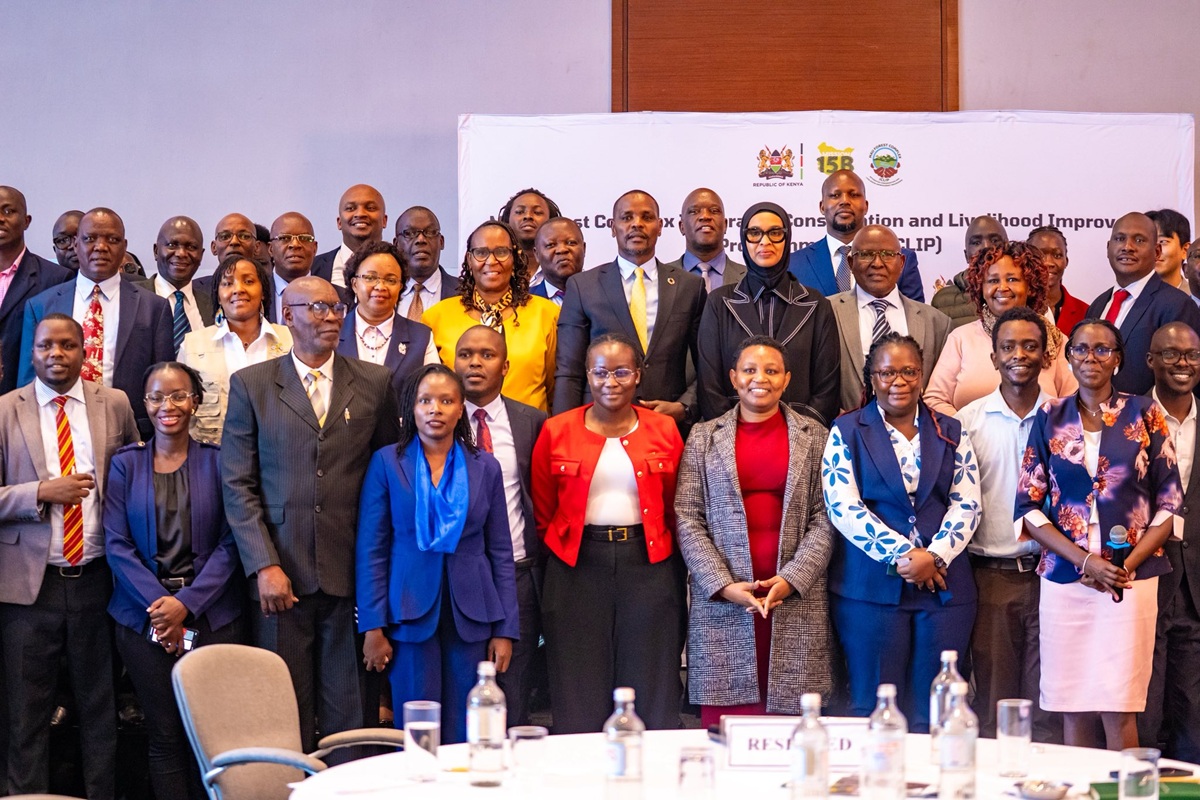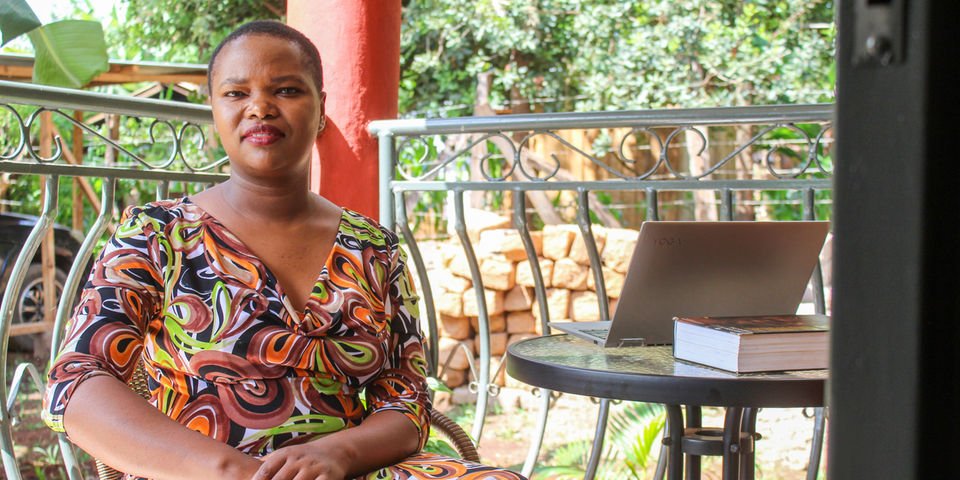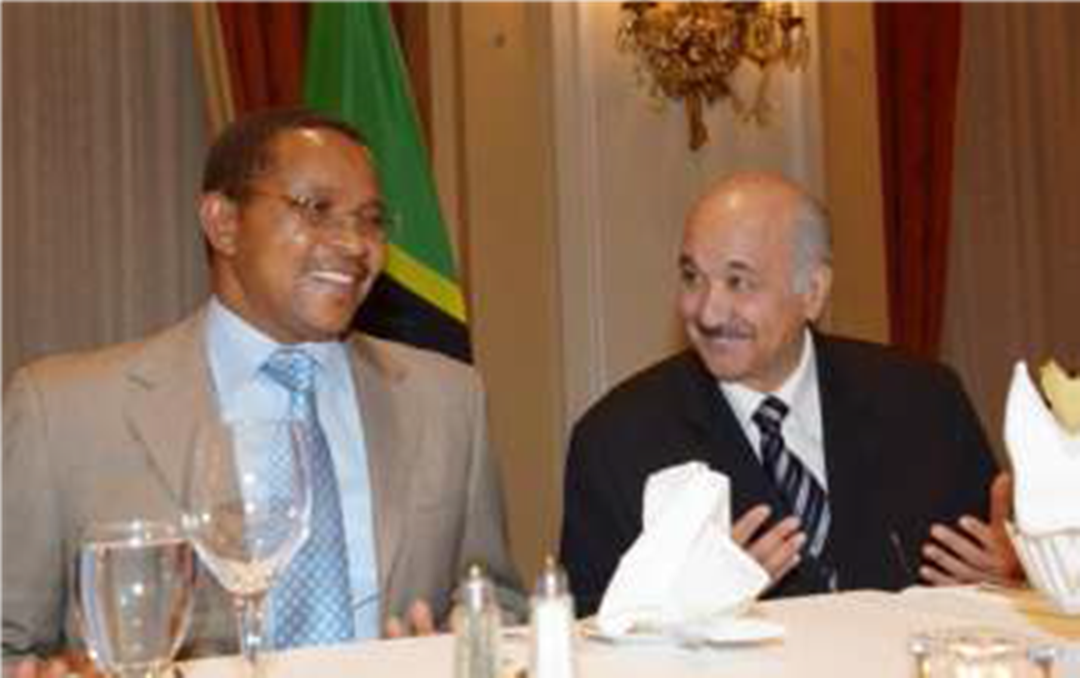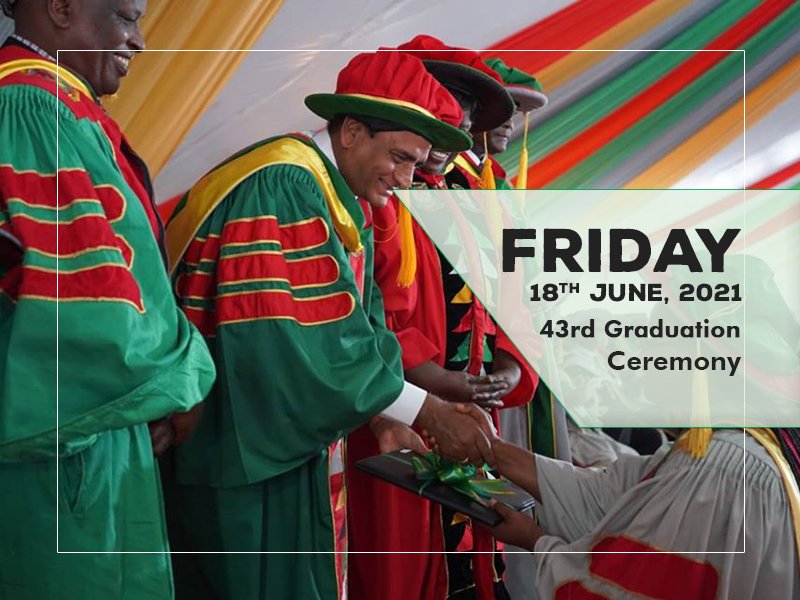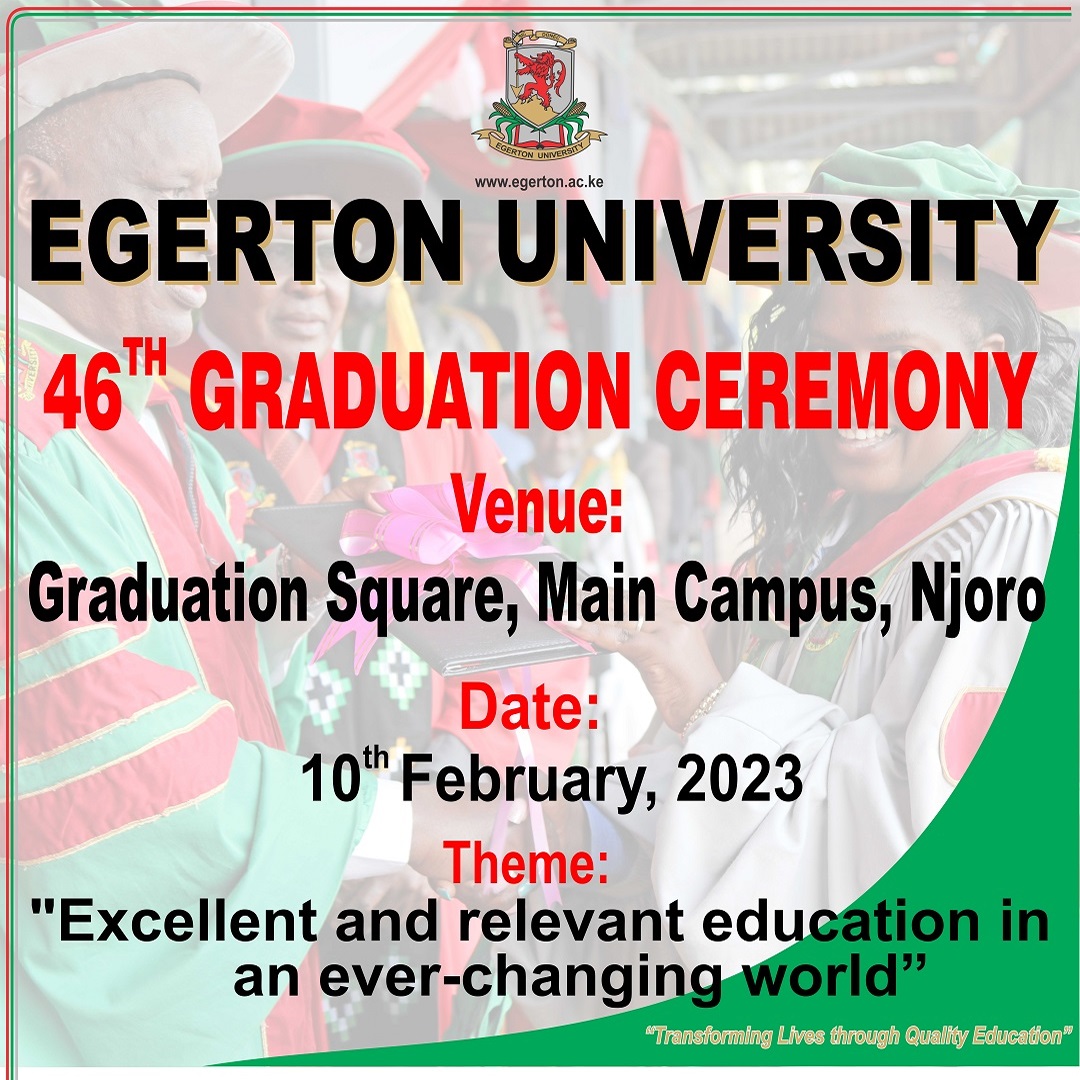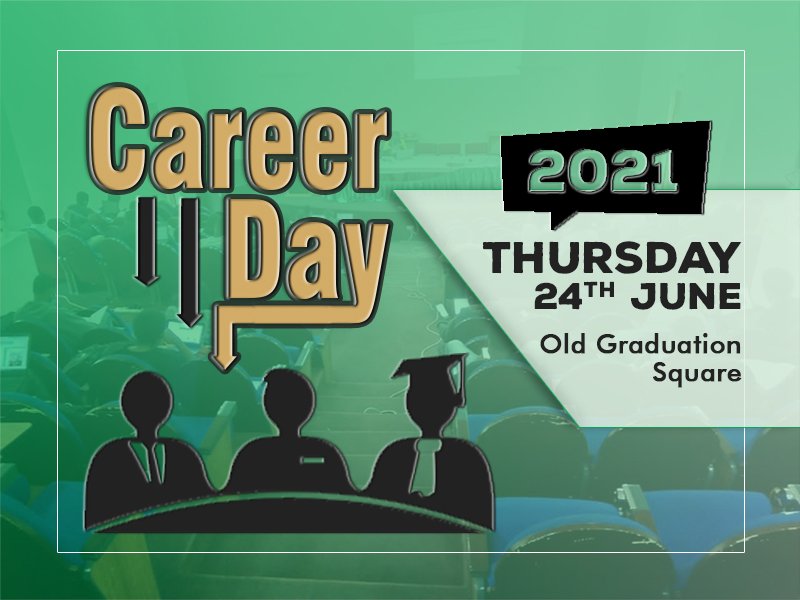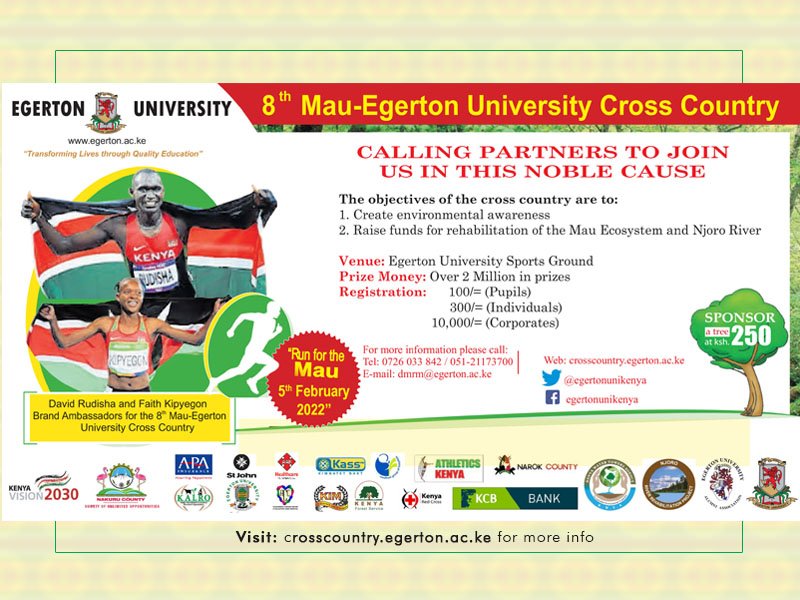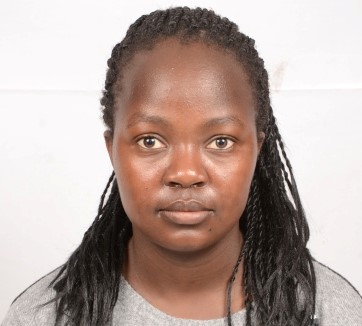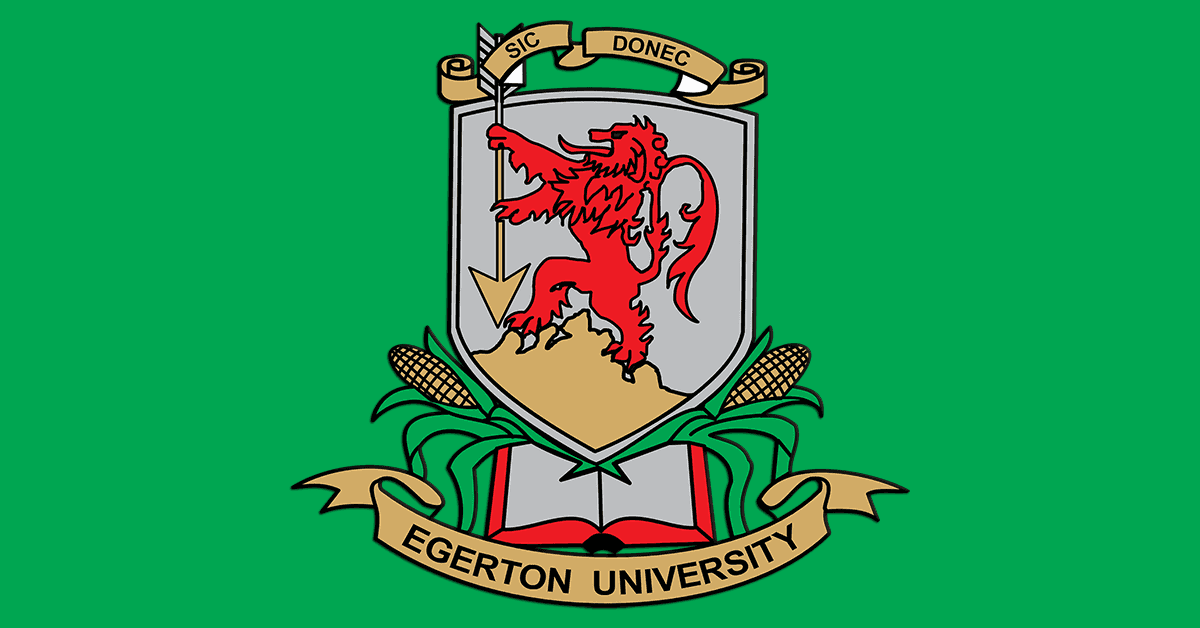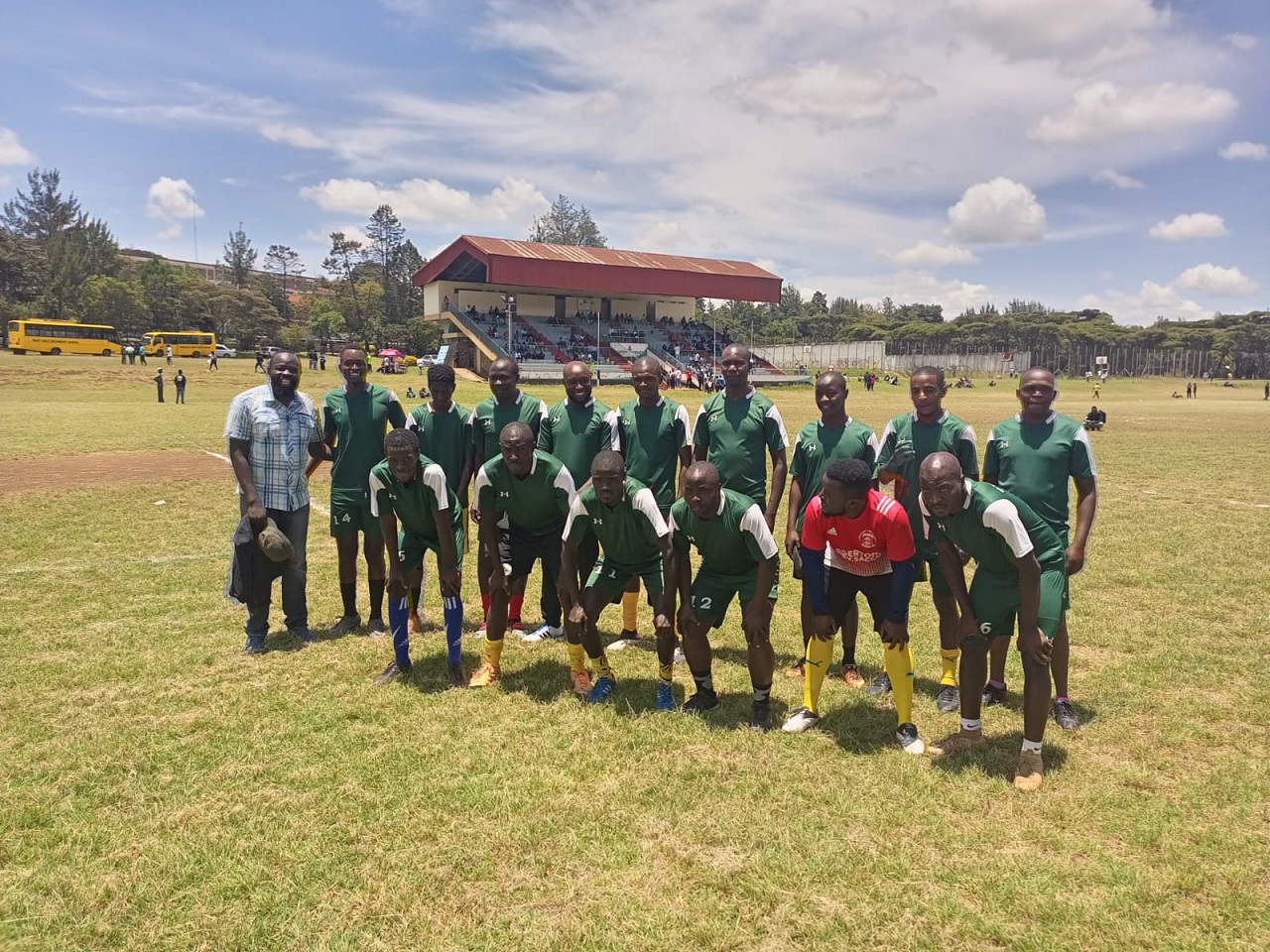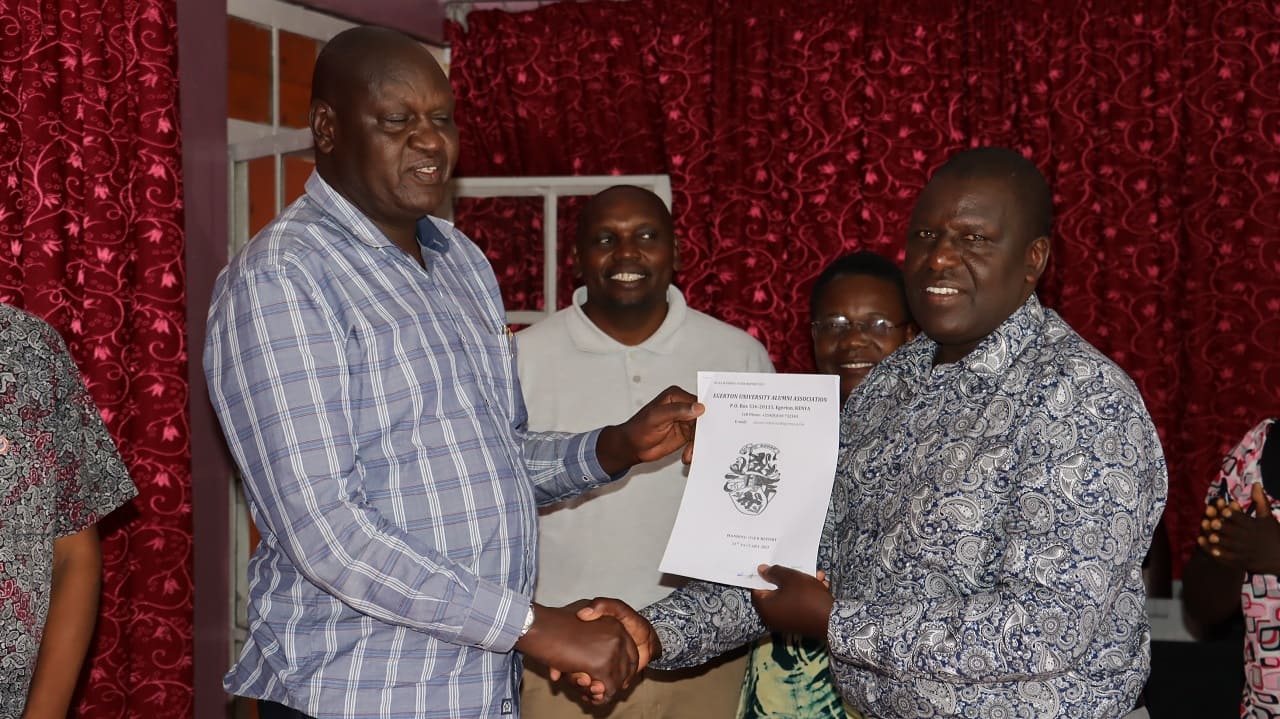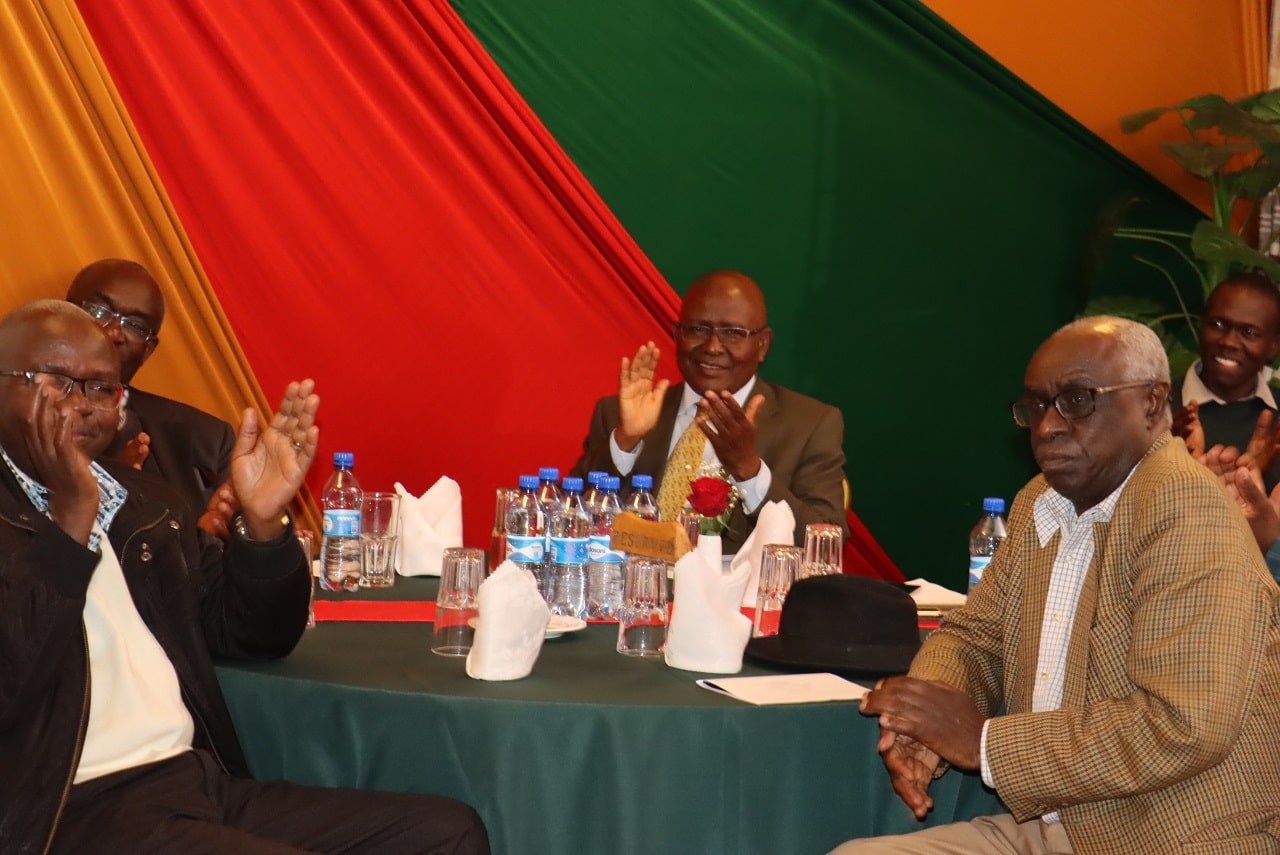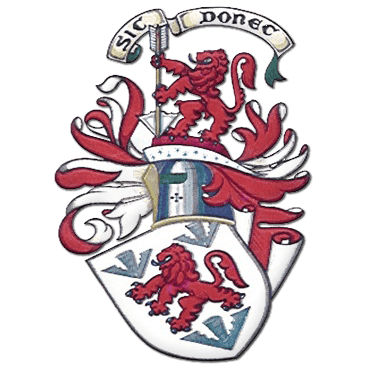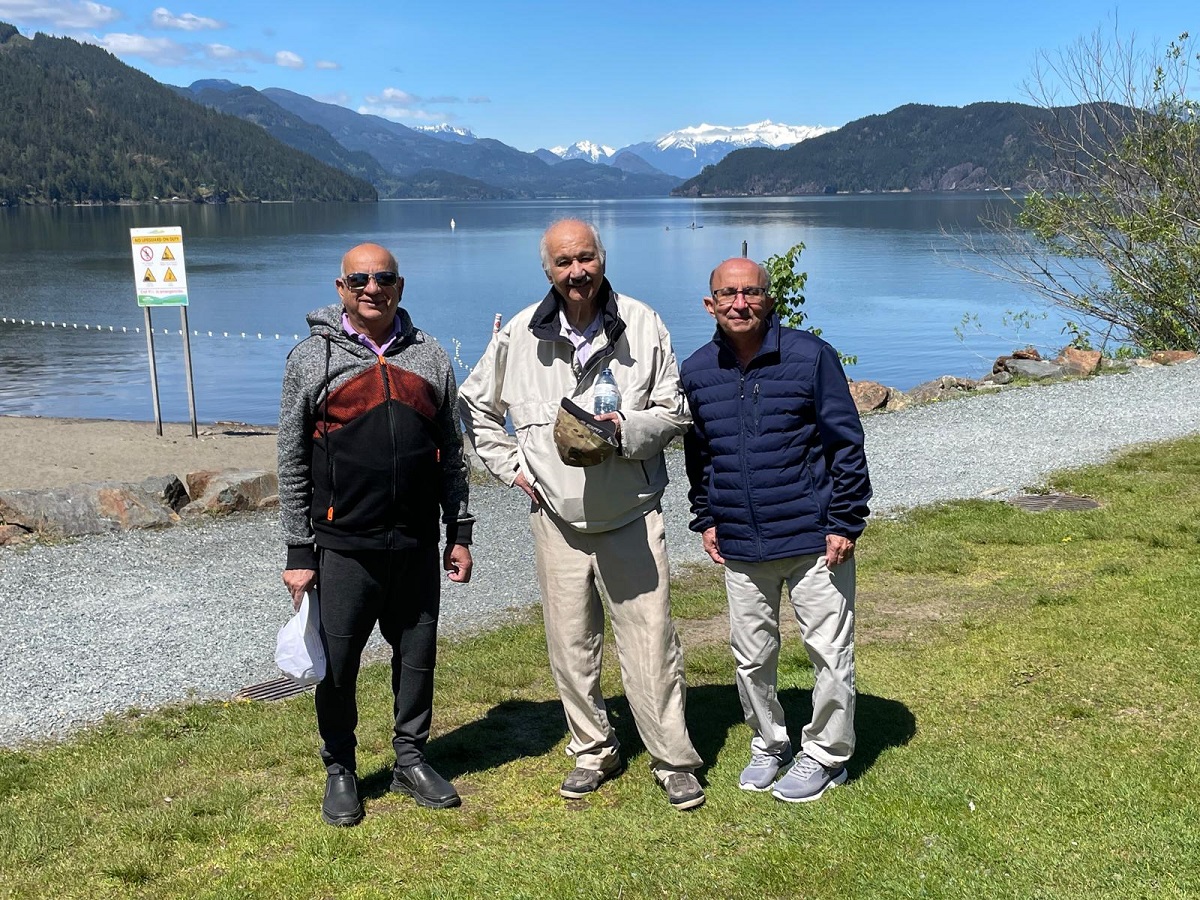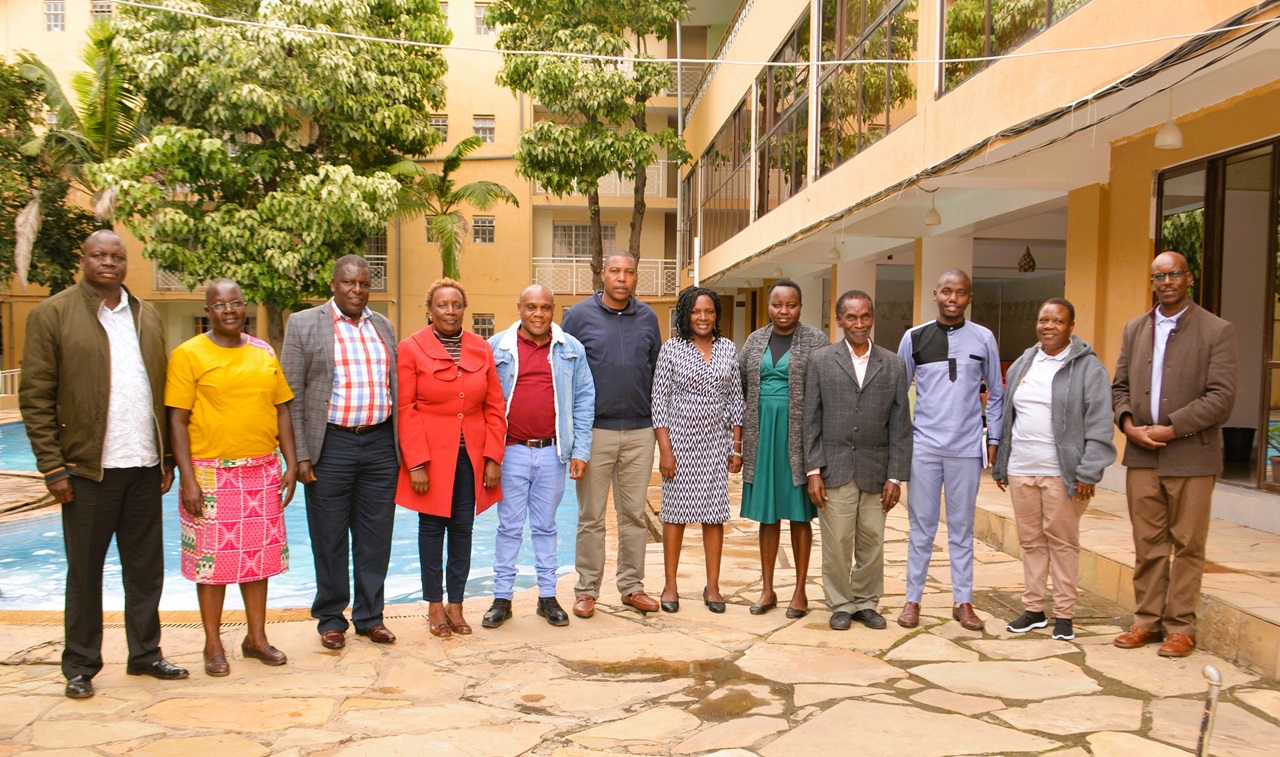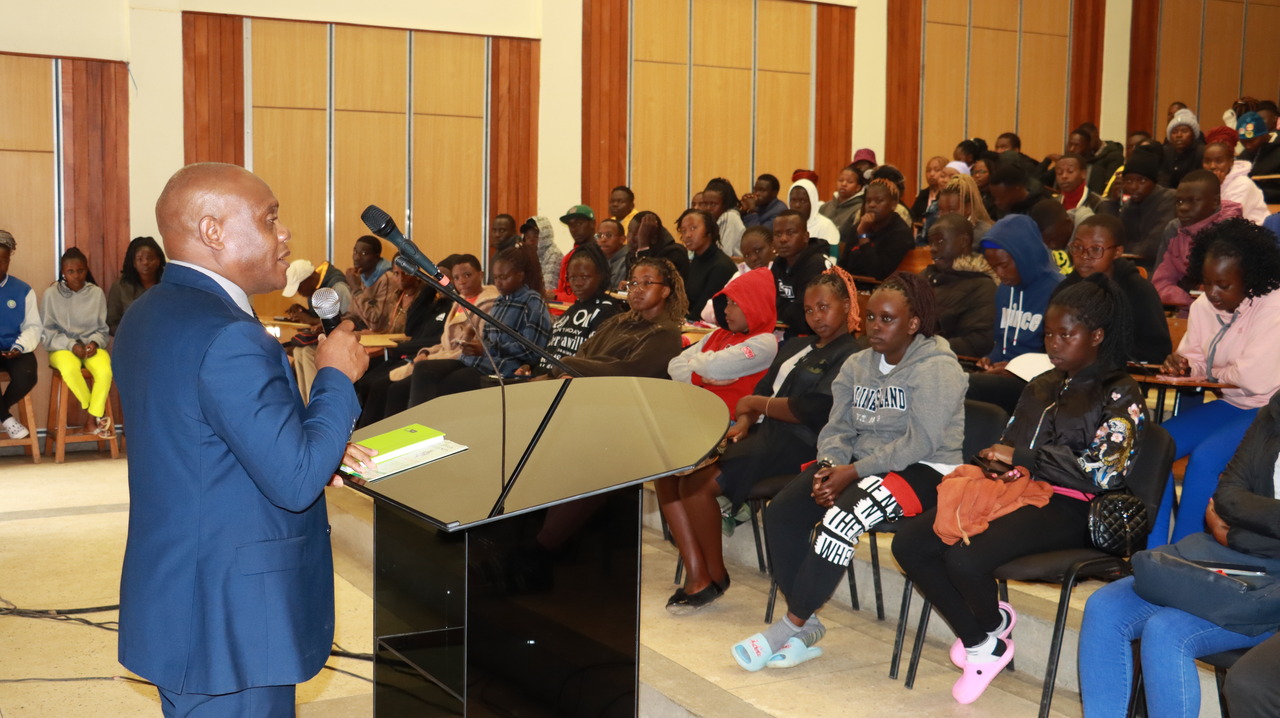-
 Dr. Purity Ngina first rose to fame when she became the youngest Ph.D. holder in Biomathematics that she attained at Strathmore University in 2018 at the age of 28.Via: Nation Media
Dr. Purity Ngina first rose to fame when she became the youngest Ph.D. holder in Biomathematics that she attained at Strathmore University in 2018 at the age of 28.Via: Nation MediaShe had three publications to her name and she mainly published papers on HIV/AIDS as she felt that it had affected many people in society. "Many people are unaware that mathematics can offer solutions to diseases. I saw a gap that needed a voice and that kept me going," she shares.
Her journey has not been an easy one as she has had her fair share of ups and downs.
"I grew up in Nyeri county in Kieni East in a small village called Mbiriri. My brother and I were raised by a single mother. I completed primary school in 2002 and unfortunately, I did not do well as I got 235 marks out of 500," Dr. Ngina recalls.
Her mother urged her to re-sit, her KCPE as she knew the value of education especially since she hadn't been able to acquire an education herself. In 2003 she re-did her exams and attained 369 marks. Luckily, she managed to secure a spot in TumuTumu Girls, based in Karatina in 2004.
Getting into high school
"It was my first time to be away from home. I struggled to fit in especially since my mum could barely afford the shopping. I decided to bury myself in books and I figured that education would take me places. I also joined the choir and got involved in activities that helped me adapt to the new environment. Deep down I knew I had to do my best," she narrates.
With a lot of perseverance and a lot of sleepless nights, she successfully finished her High School Education by scoring a B plus. In 2009, she joined Egerton University to pursue a degree in Bachelor of Education, Science, Maths, and Chemistry.
-
 At Egerton University, we are always eager to hear incredible stories of how our Alumni are transforming lives in their different professions. Recently, the Egerton University Alumni Relations Office spoke to Lr Buoga Jared Omondi who agreed to share with us his amazing journey. Jared is currently the Delivery Director, President's Delivery Unit (PDU) in the Executive Office of the President, Kenya. He is our Alumnus of the week."My desire to follow my passion in Natural Sciences began at a tender age. This was exhibited by my stellar performance in the sciences and geography coupled with practical engagement in nature oriented field activities, exhibitions, presentations and studies. In Maseno School I dominated Science Congress competitions through to the National stage. These inspired me to pursue natural resources management.From Maseno School, I joined Egerton University, Njoro Main Campus to study Natural Resources Management in August 2002. Egerton University shaped my life and worldview about conservation and management of natural resources.I joined the Youth Wildlife and Environmental Movement (YWEM) Egerton Chapter in first year. There was an election for YWEM leadership during the same semester in the month of October, occasioned by vacation of office by senior leaders who were due for graduation later in the year.I vied for the post of Deputy Director and won. During our tenure, we revamped the movement to greater heights. I led in organizing the annual Youth Environment Symposium (YES) where we invited high profile guests from UNEP, Government Agencies and Departments to speak to members.I coordinated and rallied students to participate in the Annual Egerton University Conservation Week. The Annual Conservation Week was a very spectacular event for the University. It brought all stakeholders in efforts to conserve Mau Forest. It gave me a chance to interact with many dignitaries across the globe who joined the annual event.The then University Vice Chancellor, Prof Ezra Maritim, was very supportive of the programme and exposed us to numerous partners both in the private sector and academia. When I was later elected as the Director – YWEM, it was a norm that the VC would rely on our input when planning and executing environmental and natural resources management activities in the school.I led the student team to the Annual East African Environment Network (EAEN) Conference for 4 consecutive years among other notable events and activities. I led a comprehensive tree name tagging ever done in the University.*Community Work*My aspiration to reach out to many youths and prospective students to join Natural Science courses inspired me to register a community organization in my home District (Siaya) in 2003, while I was a second year student. Thus, in April 2003, Tembea Youth Centre for Sustainable Development (Tembea) was established.The organization that would later be my employer after my graduation from Egerton in 2007 for seven years played a significant role in incubating and nurturing skills, innovation towards conservation. Whereas, I was an ardent natural resources management student, my first experience and interaction with GIS and Remote Sensing came about when I learnt about the GIS Day during the long holidays of May – Dec 2004.I was invited as a Director of my young organization by Ugunja Community Resource Centre (UCRC) to a meeting to coordinate and host the Nov 2004 GIS Day. I took a lot of interest in the application during the period. We were led by one illustrious lady called M’Lis FLin from Australia who had come to volunteer with UCRC at the time. She was so passionate about GIS, she was inducted in GIS and RS.I found out that GIS was very instrumental in the course I was following at the University. She inspired me and gave me inspiration to follow the dream of applying GIS and RS in Natural Resources Management. Needless to stay, what followed next…..*Geoinformation Science and Remote Sensing Inclusion Drive*In Jan 2005 when we resumed our studies, I was burning with passion to share with my student colleagues and our faculty dean Prof Lelo about GIS. My first stop was at Prof Lelo’s office, apart from being our dean, he was the Patron to YWEM.I impressed on him how important GIS and RS is very essential for our class and our course. I shared with him the CDs with demos showing how to manipulate geographical data and its application in natural resources management. In short, we needed a course unit on GIS and Remote Sensing to be included as one of the units to be taught to us.I shared the materials and information with my colleague students to get enough support over the same. It wasn’t an easy process to quickly accommodate our class to be taught by Dr. Onyando, who was from the Faculty of Engineering. As a cohort, we did not succeed to get the unit considered. But I am happy to report that out of the pressure and efforts, subsequent cohorts benefited.However, at a personal level, I became a private student of Dr. Onyando, who took me through the basics of geoinformation science and earth observations. It is Dr. Onyando and later Dr. Ogola who taught us photogrammetry that first mentioned to us about ITC Faculty of Geoinformation Science and Earth Observations, The Netherlands.*The Scholarship Application Attempts*My first attempt to join the ITC Faculty of Geoinformation Science was in 2009.I made two other subsequent unsuccessful attempts and gave up. However, in Oct 2012, a ray beamed at the end of the tunnel of lost hope. I successfully won a NUFFIC scholarship for Certificate International Short Course – Adaptive Management for Natural Resources Management: Supporting decentralized forest and nature Management for rural development under the auspices of the Centre for Development Innovation (CDI), Wageningen University Research, Netherlands and Kwame Nkurumah University of Science and Technology (KNUST), in Ghana.During the course, I shared my predicaments with the Course Director – Dr. Rozemeijer, Nico, a jovial fellow. He encouraged me to try again and gave me some insights. The NUFFIC had just opened the system for applications running through to 15th March 2013 at the time. On this last stab, I was placed on a provisional list of prospective scholarship recipients. I was so excited when a confirmation came in July 2013, that I had been selected.This was a shot in the arm, two successive scholarships from NUFFIC!!.Life at ITC, the Netherlands is such a wonder. A rigorous academic programme, lovely people, delicious food, people riding cycles of all shapes and forms, a host of international students, seasoned lecturers and professors from all Ivy League Universities and Institutions - that come adorned in a cocktail of characters and personalities - lovely, humble, compassionate, enthusiastic and strict in the same measure.Upon mr return in March 2015, my desire was to put my professional skills into practice. I must appreciate and acknowledge the effort that the Dutch Embassy in Kenya has made to her NUFFIC recipients Alumni network.Professionally, I have had the honor to support as a consultant to European Union Funded Projects in the rangelands under various organizations in the region and across Africa. I serve in School Boards and offer my professional services through Leaf Magnet Research and Development Ltd. I currently serve as the Delivery Director, President’s Delivery Unit in the Executive Office of the President of Kenya."NB: This story obtained some input from the Netherlands Alumni Association of Kenya Facebook page with permission from Jared. Jared is a recipient of the Dutch Government Scholarship (OKP, formerly NUFFIC).
At Egerton University, we are always eager to hear incredible stories of how our Alumni are transforming lives in their different professions. Recently, the Egerton University Alumni Relations Office spoke to Lr Buoga Jared Omondi who agreed to share with us his amazing journey. Jared is currently the Delivery Director, President's Delivery Unit (PDU) in the Executive Office of the President, Kenya. He is our Alumnus of the week."My desire to follow my passion in Natural Sciences began at a tender age. This was exhibited by my stellar performance in the sciences and geography coupled with practical engagement in nature oriented field activities, exhibitions, presentations and studies. In Maseno School I dominated Science Congress competitions through to the National stage. These inspired me to pursue natural resources management.From Maseno School, I joined Egerton University, Njoro Main Campus to study Natural Resources Management in August 2002. Egerton University shaped my life and worldview about conservation and management of natural resources.I joined the Youth Wildlife and Environmental Movement (YWEM) Egerton Chapter in first year. There was an election for YWEM leadership during the same semester in the month of October, occasioned by vacation of office by senior leaders who were due for graduation later in the year.I vied for the post of Deputy Director and won. During our tenure, we revamped the movement to greater heights. I led in organizing the annual Youth Environment Symposium (YES) where we invited high profile guests from UNEP, Government Agencies and Departments to speak to members.I coordinated and rallied students to participate in the Annual Egerton University Conservation Week. The Annual Conservation Week was a very spectacular event for the University. It brought all stakeholders in efforts to conserve Mau Forest. It gave me a chance to interact with many dignitaries across the globe who joined the annual event.The then University Vice Chancellor, Prof Ezra Maritim, was very supportive of the programme and exposed us to numerous partners both in the private sector and academia. When I was later elected as the Director – YWEM, it was a norm that the VC would rely on our input when planning and executing environmental and natural resources management activities in the school.I led the student team to the Annual East African Environment Network (EAEN) Conference for 4 consecutive years among other notable events and activities. I led a comprehensive tree name tagging ever done in the University.*Community Work*My aspiration to reach out to many youths and prospective students to join Natural Science courses inspired me to register a community organization in my home District (Siaya) in 2003, while I was a second year student. Thus, in April 2003, Tembea Youth Centre for Sustainable Development (Tembea) was established.The organization that would later be my employer after my graduation from Egerton in 2007 for seven years played a significant role in incubating and nurturing skills, innovation towards conservation. Whereas, I was an ardent natural resources management student, my first experience and interaction with GIS and Remote Sensing came about when I learnt about the GIS Day during the long holidays of May – Dec 2004.I was invited as a Director of my young organization by Ugunja Community Resource Centre (UCRC) to a meeting to coordinate and host the Nov 2004 GIS Day. I took a lot of interest in the application during the period. We were led by one illustrious lady called M’Lis FLin from Australia who had come to volunteer with UCRC at the time. She was so passionate about GIS, she was inducted in GIS and RS.I found out that GIS was very instrumental in the course I was following at the University. She inspired me and gave me inspiration to follow the dream of applying GIS and RS in Natural Resources Management. Needless to stay, what followed next…..*Geoinformation Science and Remote Sensing Inclusion Drive*In Jan 2005 when we resumed our studies, I was burning with passion to share with my student colleagues and our faculty dean Prof Lelo about GIS. My first stop was at Prof Lelo’s office, apart from being our dean, he was the Patron to YWEM.I impressed on him how important GIS and RS is very essential for our class and our course. I shared with him the CDs with demos showing how to manipulate geographical data and its application in natural resources management. In short, we needed a course unit on GIS and Remote Sensing to be included as one of the units to be taught to us.I shared the materials and information with my colleague students to get enough support over the same. It wasn’t an easy process to quickly accommodate our class to be taught by Dr. Onyando, who was from the Faculty of Engineering. As a cohort, we did not succeed to get the unit considered. But I am happy to report that out of the pressure and efforts, subsequent cohorts benefited.However, at a personal level, I became a private student of Dr. Onyando, who took me through the basics of geoinformation science and earth observations. It is Dr. Onyando and later Dr. Ogola who taught us photogrammetry that first mentioned to us about ITC Faculty of Geoinformation Science and Earth Observations, The Netherlands.*The Scholarship Application Attempts*My first attempt to join the ITC Faculty of Geoinformation Science was in 2009.I made two other subsequent unsuccessful attempts and gave up. However, in Oct 2012, a ray beamed at the end of the tunnel of lost hope. I successfully won a NUFFIC scholarship for Certificate International Short Course – Adaptive Management for Natural Resources Management: Supporting decentralized forest and nature Management for rural development under the auspices of the Centre for Development Innovation (CDI), Wageningen University Research, Netherlands and Kwame Nkurumah University of Science and Technology (KNUST), in Ghana.During the course, I shared my predicaments with the Course Director – Dr. Rozemeijer, Nico, a jovial fellow. He encouraged me to try again and gave me some insights. The NUFFIC had just opened the system for applications running through to 15th March 2013 at the time. On this last stab, I was placed on a provisional list of prospective scholarship recipients. I was so excited when a confirmation came in July 2013, that I had been selected.This was a shot in the arm, two successive scholarships from NUFFIC!!.Life at ITC, the Netherlands is such a wonder. A rigorous academic programme, lovely people, delicious food, people riding cycles of all shapes and forms, a host of international students, seasoned lecturers and professors from all Ivy League Universities and Institutions - that come adorned in a cocktail of characters and personalities - lovely, humble, compassionate, enthusiastic and strict in the same measure.Upon mr return in March 2015, my desire was to put my professional skills into practice. I must appreciate and acknowledge the effort that the Dutch Embassy in Kenya has made to her NUFFIC recipients Alumni network.Professionally, I have had the honor to support as a consultant to European Union Funded Projects in the rangelands under various organizations in the region and across Africa. I serve in School Boards and offer my professional services through Leaf Magnet Research and Development Ltd. I currently serve as the Delivery Director, President’s Delivery Unit in the Executive Office of the President of Kenya."NB: This story obtained some input from the Netherlands Alumni Association of Kenya Facebook page with permission from Jared. Jared is a recipient of the Dutch Government Scholarship (OKP, formerly NUFFIC). -
 Greetings to the Alumni at the Forty-First Graduation Ceremeony of Egerton University! Congratulations on the hardwork you have done. You have beengiven the tools; now put them to work.I'm grateful that Egerton gave methe first tools that headed me in thedirection of agriculture, setting mycourse in life when I was 17 years old, theright time to do it. It started me off on mycareer of thirty-three years working forthe United States Department ofAgriculture (USDA) in AgriculturalResearch.World War II was not yet half overw h e n t h e Eg er t o n F a r m S ch o o lestablished a programme for an expectedinflux of returning white servicemen whowould want to get into agriculture oncethe war came to an end. Participating inthat programme was a perfect experiencefor me. I was born and raised in Kenyaand was familiar with the environmentbut had no knowledge of the details ofhow crops were grown and livestockmanaged.I was one of three young men whowere recruited as sort of guinea pigs – aDane, an Irishman, and a Yank – to helpthe staff develop a-learn-by-doingagricultural training programme. I hearthat there is something like a myth nowcentred on “The First Three” studentswith whom the school started.The three of us trainees were giventhe use of a new home which was nicelyfurnished. Perhaps it was intended for aninstructor who couldn't be hired becauseof wartime shortages. The school hired aman as a cook and housekeeper for us.We three had no contact with the youngerstudents at the junior secondary schoolwhich was part of the Egerton schoolcum-training-farm.Since a big part of the training wasthe “doing”, the three of us worked together on most projects. There weretogether on most projects. There wereexceptions, like when we took turns atmilking. A lot of our time was spent doingmanual labour. But we also did “booklearning”.
Greetings to the Alumni at the Forty-First Graduation Ceremeony of Egerton University! Congratulations on the hardwork you have done. You have beengiven the tools; now put them to work.I'm grateful that Egerton gave methe first tools that headed me in thedirection of agriculture, setting mycourse in life when I was 17 years old, theright time to do it. It started me off on mycareer of thirty-three years working forthe United States Department ofAgriculture (USDA) in AgriculturalResearch.World War II was not yet half overw h e n t h e Eg er t o n F a r m S ch o o lestablished a programme for an expectedinflux of returning white servicemen whowould want to get into agriculture oncethe war came to an end. Participating inthat programme was a perfect experiencefor me. I was born and raised in Kenyaand was familiar with the environmentbut had no knowledge of the details ofhow crops were grown and livestockmanaged.I was one of three young men whowere recruited as sort of guinea pigs – aDane, an Irishman, and a Yank – to helpthe staff develop a-learn-by-doingagricultural training programme. I hearthat there is something like a myth nowcentred on “The First Three” studentswith whom the school started.The three of us trainees were giventhe use of a new home which was nicelyfurnished. Perhaps it was intended for aninstructor who couldn't be hired becauseof wartime shortages. The school hired aman as a cook and housekeeper for us.We three had no contact with the youngerstudents at the junior secondary schoolwhich was part of the Egerton schoolcum-training-farm.Since a big part of the training wasthe “doing”, the three of us worked together on most projects. There weretogether on most projects. There wereexceptions, like when we took turns atmilking. A lot of our time was spent doingmanual labour. But we also did “booklearning”.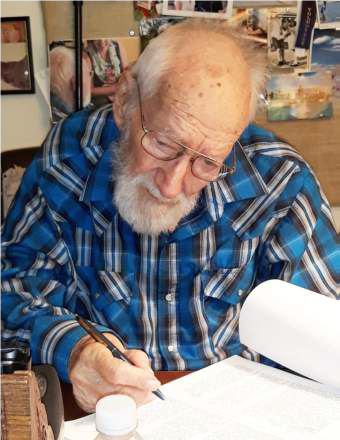 Mr. Paul R. Nixon peruses a document at his home in Fredericksburg, Texas, USA. (Photo courtesy of Mr. Nixon)Economics is a vital part ofsuccessful farming. We discussed therotation of crops, and the economics ofvarious crops. We made estimates of costs of various steps involved incosts of various steps involved ingrowing and marketing of a crop orlivestock. This included dealing with abank, whether asking for a cash advanceor a longer term loan. We had to makeproper conversions in various systems ofweights and measures. Another big part was the understanding of the growth processes of plants and animals. We could barelyplants and animals. We could barelytouch the surface of this vast subject. Ihope future students of a short course willkeep their notes and be prompted tof u r t h e r s t u d y. B e c a u s e o f t i m elimitations, we hardly dwelt on subjectslike soils and weather, let alone anysubjects worthy of Ph.D. dissertations.My personal interest was in farmimplements, particularly the school'sFarmall tractor. I enjoyed tinkering withit, supposedly improving the timing ofengine performance. We had a new Fordpickup truck to use on the job, and one ofthe other two trainees ran it off the muddyroad into a bank. I think I was theprincipal's pet because, after that, he saidthat I was to be the only one to drive it.I had brought my 3030 Winchesterrifle to school with me and used it to killmeat for the table and to scare off gamethat raided our field crops.Thinking back, I realise howvaluable my six months at Egerton werein shaping my career. My first job was atthe Menengai Estates wheat fields. I usedwhat I learned at Egerton in duties suchas keeping the threshers on combineharvesters in running order.Next I went to work for the KenyaSoil Conservation Service (KSCS). Twoof my special friends in the KSCS wereOnesmus Musyoki, who went on to anoutstanding career in soil conservation inUkambani, and Peter Koinange, the sonof a Kikuyu paramount chief. Sometimeson walks during off-duty hours I enjoyedwonderful discussions with these menwho were secondary school graduates,which was not common in those days,and we all had a love for the land. Theywere several years older than I. We oftentalked about the need for preventing theland's deterioration by erosion fromrainfall.Another one of the people I workedwith was a rod man on the surveyingteam, who was about my age. He and Ialso had many discussions, with each ofus vigorously arguing our point of view.He pointed out the inequities in thetreatment of the native people and the unfairness of settlers' privileges, while Iunfairness of settlers' privileges, while Imaintained the point of view of somewazungu. I sincerely regret that, as youngas I was, I did not have a broader, morebalanced understanding at the time.I was an American citizen by birth,and registered for the draft when I turned18, but was not called to service untilover two and a half years later, when Iwas working for the KSCS. I worked as asurveyor in the US Army AviationEngineers battalion, which was buildingand maintaining airfields in Egypt andArabia.At the end of World War II, I went tonight school at Brooklyn High School inNew York to finish my secondarytraining, and was accepted to college.Iowa State University was recognised asthe premier agricultural traininginstitution, so that's where I went for myBachelor's degree. After working for theUSDA Soil Conservation Service for twoyears, I returned to Iowa State for aM a s t e r ' s d e g r e e i n a g r i c u l t u r a lengineering. Later in my career, I had theopportunity to go to Stanford Universityfor a Master's degree in hydrology.The first half of my career, whichwas in California, was in watermanagement engineering, and the lasthalf was in Texas, where I worked inremote sensing using aircraft andsatellite data. In California, my principalduties were as leader of a court-orderedmulti-agency study of ground waterrecharge in the Santa Ynez River lowerbasin. A large reservoir had been built onone side of a mountain range, and atunnel dug to deliver water to counties onthe other side. When I delivered the finalreport of the study's findings, I hadworked myself out of a job.In Texas, one activity was asPrincipal Investigator of the HeatCapacity Mapping Mission of theNational Aeronautics and SpaceAdministration (NASA), using satellitedata. Then, during the last several yearsof my career, I was at the USDASubtropical Research Labs as researchleader, where we were developing techniques that related to ground, aircrafttechniques that related to ground, aircraftand satellite information, and theirapplication to soils, climate, andcropping practices and problems. Thisincluded developing procedures for thecoordinate use of satellite data systems.LANDSAT, NOAA-7, and GOES werestate of the art at the time.I went back to Kenya sixty yearsafter leaving, found a population seventimes what it was when I was there, andwas pleased to see the changes that hadtaken place, even sky scrapers in Nairobi.What progress! Of course it also broughtproblems, starting with a growingpopulation's strain on natural resources.Compare the Kenya of the old dayswith today's where it seems everybody iswearing shoes and carrying phones. Atour time, in the interior, there were nomeans of wheeled transport, roads ortowns; there were digging sticks insteadof jembes, no working for wages, nomethod of writing or numbering systems,no standard weights or measures, and nocalendar. Kenya has come a long waysince that period of history.Now there is technology. Africanshave not only grasped but alsochampioned some of the technologicalinnovations. Kenya almost skipped overlandline phones and went straight tomobile, for example. All this speaks wellfor an ambitious people.There's been such a big step ineducation. I'm thrilled that Egerton hasdeveloped into such an outstandinguniversity, and it is due in large part to anexcellent faculty and bright studentsdriven by ambition who decide to cometo it.Egerton University's graduands of2019 will spearhead Kenya's future. Ihope that every one of you, in whateveryou do and in whatever venue, will bringbenefit to the people of Kenya andbeyond, thereby bestowing honour upon Egerton University.
Mr. Paul R. Nixon peruses a document at his home in Fredericksburg, Texas, USA. (Photo courtesy of Mr. Nixon)Economics is a vital part ofsuccessful farming. We discussed therotation of crops, and the economics ofvarious crops. We made estimates of costs of various steps involved incosts of various steps involved ingrowing and marketing of a crop orlivestock. This included dealing with abank, whether asking for a cash advanceor a longer term loan. We had to makeproper conversions in various systems ofweights and measures. Another big part was the understanding of the growth processes of plants and animals. We could barelyplants and animals. We could barelytouch the surface of this vast subject. Ihope future students of a short course willkeep their notes and be prompted tof u r t h e r s t u d y. B e c a u s e o f t i m elimitations, we hardly dwelt on subjectslike soils and weather, let alone anysubjects worthy of Ph.D. dissertations.My personal interest was in farmimplements, particularly the school'sFarmall tractor. I enjoyed tinkering withit, supposedly improving the timing ofengine performance. We had a new Fordpickup truck to use on the job, and one ofthe other two trainees ran it off the muddyroad into a bank. I think I was theprincipal's pet because, after that, he saidthat I was to be the only one to drive it.I had brought my 3030 Winchesterrifle to school with me and used it to killmeat for the table and to scare off gamethat raided our field crops.Thinking back, I realise howvaluable my six months at Egerton werein shaping my career. My first job was atthe Menengai Estates wheat fields. I usedwhat I learned at Egerton in duties suchas keeping the threshers on combineharvesters in running order.Next I went to work for the KenyaSoil Conservation Service (KSCS). Twoof my special friends in the KSCS wereOnesmus Musyoki, who went on to anoutstanding career in soil conservation inUkambani, and Peter Koinange, the sonof a Kikuyu paramount chief. Sometimeson walks during off-duty hours I enjoyedwonderful discussions with these menwho were secondary school graduates,which was not common in those days,and we all had a love for the land. Theywere several years older than I. We oftentalked about the need for preventing theland's deterioration by erosion fromrainfall.Another one of the people I workedwith was a rod man on the surveyingteam, who was about my age. He and Ialso had many discussions, with each ofus vigorously arguing our point of view.He pointed out the inequities in thetreatment of the native people and the unfairness of settlers' privileges, while Iunfairness of settlers' privileges, while Imaintained the point of view of somewazungu. I sincerely regret that, as youngas I was, I did not have a broader, morebalanced understanding at the time.I was an American citizen by birth,and registered for the draft when I turned18, but was not called to service untilover two and a half years later, when Iwas working for the KSCS. I worked as asurveyor in the US Army AviationEngineers battalion, which was buildingand maintaining airfields in Egypt andArabia.At the end of World War II, I went tonight school at Brooklyn High School inNew York to finish my secondarytraining, and was accepted to college.Iowa State University was recognised asthe premier agricultural traininginstitution, so that's where I went for myBachelor's degree. After working for theUSDA Soil Conservation Service for twoyears, I returned to Iowa State for aM a s t e r ' s d e g r e e i n a g r i c u l t u r a lengineering. Later in my career, I had theopportunity to go to Stanford Universityfor a Master's degree in hydrology.The first half of my career, whichwas in California, was in watermanagement engineering, and the lasthalf was in Texas, where I worked inremote sensing using aircraft andsatellite data. In California, my principalduties were as leader of a court-orderedmulti-agency study of ground waterrecharge in the Santa Ynez River lowerbasin. A large reservoir had been built onone side of a mountain range, and atunnel dug to deliver water to counties onthe other side. When I delivered the finalreport of the study's findings, I hadworked myself out of a job.In Texas, one activity was asPrincipal Investigator of the HeatCapacity Mapping Mission of theNational Aeronautics and SpaceAdministration (NASA), using satellitedata. Then, during the last several yearsof my career, I was at the USDASubtropical Research Labs as researchleader, where we were developing techniques that related to ground, aircrafttechniques that related to ground, aircraftand satellite information, and theirapplication to soils, climate, andcropping practices and problems. Thisincluded developing procedures for thecoordinate use of satellite data systems.LANDSAT, NOAA-7, and GOES werestate of the art at the time.I went back to Kenya sixty yearsafter leaving, found a population seventimes what it was when I was there, andwas pleased to see the changes that hadtaken place, even sky scrapers in Nairobi.What progress! Of course it also broughtproblems, starting with a growingpopulation's strain on natural resources.Compare the Kenya of the old dayswith today's where it seems everybody iswearing shoes and carrying phones. Atour time, in the interior, there were nomeans of wheeled transport, roads ortowns; there were digging sticks insteadof jembes, no working for wages, nomethod of writing or numbering systems,no standard weights or measures, and nocalendar. Kenya has come a long waysince that period of history.Now there is technology. Africanshave not only grasped but alsochampioned some of the technologicalinnovations. Kenya almost skipped overlandline phones and went straight tomobile, for example. All this speaks wellfor an ambitious people.There's been such a big step ineducation. I'm thrilled that Egerton hasdeveloped into such an outstandinguniversity, and it is due in large part to anexcellent faculty and bright studentsdriven by ambition who decide to cometo it.Egerton University's graduands of2019 will spearhead Kenya's future. Ihope that every one of you, in whateveryou do and in whatever venue, will bringbenefit to the people of Kenya andbeyond, thereby bestowing honour upon Egerton University. -
 My early years bring for memories of the hard struggle my parents wagedto provide a living for our family. Welived in the village of Makuyuni, a tinystation on the railway line from Tanga toMoshi, and our sole possession was asmall duka. We had no electricity, norunning water, and we had to contendwith a hole dug in the ground for a toilet.Our house provided no protection fromthe heat wave, which caused such aserious infection in my eye that I nearlylost my sight.With little understanding of ourcircumstances, one day I asked my Dad:“Why do you always choose the last trainon Sunday night for the trip from Tangato Makuyuni”? “My son”, he saidthoughtfully, “this is when the third classticket is cheapest, as the train is almostempty. This is all we can afford.”Despite the hardships, my parentsdreamt of a different future for theirchildren, and that meant giving them thebest education. Spurred by their dream, Icompleted my Cambridge O-levels.(Grade 12). Moving ahead would have(Grade 12). Moving ahead would havebeen difficult, but I was fortunate toqualify for an Aga Khan Scholarship.This took me to Egerton College inKenya, where I enrolled in the class of1965 to study Agriculture.The freedom that college broughtdazzled me. There I was, playing theguitar and Beatles music, becomingcaptain of the cricket team, partying inthe Junior Common Room, and havingfun travelling to Nakuru, Nairobi, andMombasa. But lo and behold: At the endof my first year, I got the dreadful“Academic Warning”. The writing wason the wall: I could go home withoutcompleting college.It was our new Principal, Dr. WilliamOdongo Omamo, who saved me. Oneday while walking from lecture room A1to the Administration Building, I heard avoice from behind: “My boys, have youfinished your lectures? What are yougoing to do next?” He was so welcoming,concerned, and sincere that I became allattention. “You may have all the fun
My early years bring for memories of the hard struggle my parents wagedto provide a living for our family. Welived in the village of Makuyuni, a tinystation on the railway line from Tanga toMoshi, and our sole possession was asmall duka. We had no electricity, norunning water, and we had to contendwith a hole dug in the ground for a toilet.Our house provided no protection fromthe heat wave, which caused such aserious infection in my eye that I nearlylost my sight.With little understanding of ourcircumstances, one day I asked my Dad:“Why do you always choose the last trainon Sunday night for the trip from Tangato Makuyuni”? “My son”, he saidthoughtfully, “this is when the third classticket is cheapest, as the train is almostempty. This is all we can afford.”Despite the hardships, my parentsdreamt of a different future for theirchildren, and that meant giving them thebest education. Spurred by their dream, Icompleted my Cambridge O-levels.(Grade 12). Moving ahead would have(Grade 12). Moving ahead would havebeen difficult, but I was fortunate toqualify for an Aga Khan Scholarship.This took me to Egerton College inKenya, where I enrolled in the class of1965 to study Agriculture.The freedom that college broughtdazzled me. There I was, playing theguitar and Beatles music, becomingcaptain of the cricket team, partying inthe Junior Common Room, and havingfun travelling to Nakuru, Nairobi, andMombasa. But lo and behold: At the endof my first year, I got the dreadful“Academic Warning”. The writing wason the wall: I could go home withoutcompleting college.It was our new Principal, Dr. WilliamOdongo Omamo, who saved me. Oneday while walking from lecture room A1to the Administration Building, I heard avoice from behind: “My boys, have youfinished your lectures? What are yougoing to do next?” He was so welcoming,concerned, and sincere that I became allattention. “You may have all the fun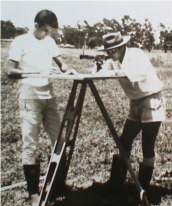 Mr. Sadru Nazarali (left) at a Field Survey practical during his diploma studies at Egerton Agricultural College in 1965-1967 (All photos in the story courtesy of Mr. Nazarali)youwant, but make sure you study hard. Be careful not to waste your chance tocareful not to waste your chance tobecome someone of substance andchange your destiny. If I can help you inanyway, please do not hesitate to call onme”, was his advice. I instantly knewthat I would never let him – and myself –down.I concentrated on my studies, alwaysdriven ahead by the spirit of seriousnessthat prevailed at the College, and in theend I not only survived but triumphed. Ireceived my diploma in 1967 at agraduation ceremony honoured by hisExcellency President Jomo Kenyatta ofKenya.I w a s t h e fi r s t g r a d u a t e o fpostsecondary education in my familyhistory. My parents felt honoured andwere greatly proud of me. But mysuccess was accompanied by amazingresponsibilities. The onus was now onme to help my family. I was lucky to get ajob with a large farming conglomerate,Karimjee Jivanji Estates, at a tea plantation in the Usambara Mountains inplantation in the Usambara Mountains inTanzania. I soon qualified to attend theTea Managers course at the Kericho TeaSchool, and became an AssistantManager on the plantation, which hadapproximately 400 tea-pluckers and 100field supervisors.At home in Tanga, with my mother,who was blessed with a green thumb, wewent into a seedling plant business aswell as a home-based food processingbusiness. Unfortunately, this excitingbeginning was suddenly interrupted in am a n n e r t h a t h a d f a r - r e a c h i n gconsequences for our family and for theeconomy of Tanzania.In late 1970 and 1971, as aconsequence of nationalisation, manyAsians lost their business assets, farmsand plantations, and everything else wepossessed. There was a group ofEgertonians in Tanzania who had kept inclose touch since graduation, and in thespirit of oneness built up over the years,we collectively decided to look for theproverbial greener pastures elsewhere. Inthe course of twelve months, ten of uslanded in Canada, many finding home inEdmonton. Over the next five years weattracted other friends, besides bringingour parents and siblings.Canada is a country with a strong civil society, respect for democracy, andcivil society, respect for democracy, andappreciation for pluralism. It also ensuressecurity of property and business. Westarted building our new lives there. Overthe years, we Egertonians flourished inbusiness, politics, philanthropy, andglobal citizenship. Our children attendedthe best schools we could wish for andprospered too.I have been involved in multiplebusiness ventures, including financialplanning, building a chain of retail stores,real estate development, coordinatingi n t e r n a t i o n a l r e c r u i t m e n t o fprofessionals, and providing advice forother immigrant communities inbusiness and real estate.I was the first Edmonton ChapterChair of the Aga Khan DevelopmentNetwork (AKDN), an organisationwhich provides various types ofassistance to the developing world. Oneof our first activities was to organise apartnership walk in Edmonton in 1985.From an initial number of 145 walkerswe have now reached 4,000. Thesewalkers get donation pledges for projectsin various countries in Africa and Asia.Our collaborative work with the AgaKhan University in Karachi, Pakistan,has been recognised by His Highness the Aga Khan.Aga Khan.I was also instrumental in gettingthree Ismaili Centers established inEdmonton. I am presently involved insetting up a multigenerational housingfor senior citizens near one of theCentres.The Nazarali family has also beensupporting political campaigns inCanada for the last forty years. This hasled to close associations with manypoliticians, including Prime MinisterStephen Harper and Prime MinisterJustin Trudeau of Canada.My joy of assisting development inAfrica never stops. As President of theCanada-Tanzania Business Council, Iwas able to host President JakayaKikwete of Tanzania twice in Canada.Building capacity for the youth hasbeen another focus in my efforts, and Imake sure that my generation as a wholetakes pride in this endeavour. In thisparticular initiative, I have sought andfound alignments with many similarorganisations.In all I do, I am deeply conscious ofhow Egerton College has taught me toresolve local issues with global solutions.
Mr. Sadru Nazarali (left) at a Field Survey practical during his diploma studies at Egerton Agricultural College in 1965-1967 (All photos in the story courtesy of Mr. Nazarali)youwant, but make sure you study hard. Be careful not to waste your chance tocareful not to waste your chance tobecome someone of substance andchange your destiny. If I can help you inanyway, please do not hesitate to call onme”, was his advice. I instantly knewthat I would never let him – and myself –down.I concentrated on my studies, alwaysdriven ahead by the spirit of seriousnessthat prevailed at the College, and in theend I not only survived but triumphed. Ireceived my diploma in 1967 at agraduation ceremony honoured by hisExcellency President Jomo Kenyatta ofKenya.I w a s t h e fi r s t g r a d u a t e o fpostsecondary education in my familyhistory. My parents felt honoured andwere greatly proud of me. But mysuccess was accompanied by amazingresponsibilities. The onus was now onme to help my family. I was lucky to get ajob with a large farming conglomerate,Karimjee Jivanji Estates, at a tea plantation in the Usambara Mountains inplantation in the Usambara Mountains inTanzania. I soon qualified to attend theTea Managers course at the Kericho TeaSchool, and became an AssistantManager on the plantation, which hadapproximately 400 tea-pluckers and 100field supervisors.At home in Tanga, with my mother,who was blessed with a green thumb, wewent into a seedling plant business aswell as a home-based food processingbusiness. Unfortunately, this excitingbeginning was suddenly interrupted in am a n n e r t h a t h a d f a r - r e a c h i n gconsequences for our family and for theeconomy of Tanzania.In late 1970 and 1971, as aconsequence of nationalisation, manyAsians lost their business assets, farmsand plantations, and everything else wepossessed. There was a group ofEgertonians in Tanzania who had kept inclose touch since graduation, and in thespirit of oneness built up over the years,we collectively decided to look for theproverbial greener pastures elsewhere. Inthe course of twelve months, ten of uslanded in Canada, many finding home inEdmonton. Over the next five years weattracted other friends, besides bringingour parents and siblings.Canada is a country with a strong civil society, respect for democracy, andcivil society, respect for democracy, andappreciation for pluralism. It also ensuressecurity of property and business. Westarted building our new lives there. Overthe years, we Egertonians flourished inbusiness, politics, philanthropy, andglobal citizenship. Our children attendedthe best schools we could wish for andprospered too.I have been involved in multiplebusiness ventures, including financialplanning, building a chain of retail stores,real estate development, coordinatingi n t e r n a t i o n a l r e c r u i t m e n t o fprofessionals, and providing advice forother immigrant communities inbusiness and real estate.I was the first Edmonton ChapterChair of the Aga Khan DevelopmentNetwork (AKDN), an organisationwhich provides various types ofassistance to the developing world. Oneof our first activities was to organise apartnership walk in Edmonton in 1985.From an initial number of 145 walkerswe have now reached 4,000. Thesewalkers get donation pledges for projectsin various countries in Africa and Asia.Our collaborative work with the AgaKhan University in Karachi, Pakistan,has been recognised by His Highness the Aga Khan.Aga Khan.I was also instrumental in gettingthree Ismaili Centers established inEdmonton. I am presently involved insetting up a multigenerational housingfor senior citizens near one of theCentres.The Nazarali family has also beensupporting political campaigns inCanada for the last forty years. This hasled to close associations with manypoliticians, including Prime MinisterStephen Harper and Prime MinisterJustin Trudeau of Canada.My joy of assisting development inAfrica never stops. As President of theCanada-Tanzania Business Council, Iwas able to host President JakayaKikwete of Tanzania twice in Canada.Building capacity for the youth hasbeen another focus in my efforts, and Imake sure that my generation as a wholetakes pride in this endeavour. In thisparticular initiative, I have sought andfound alignments with many similarorganisations.In all I do, I am deeply conscious ofhow Egerton College has taught me toresolve local issues with global solutions. -
 A good number of years ago, in 1973, I received agood number of years ago, in 1973, I received abursary from the Aga Khan Department ofEducation (Tanzania) to study Dairy Technologyat Egerton College, as it was then known. I recall trackingfrom Moshi to Nakuru with Naushad Jan Mohamed, who hadalso received a bursary to studyAgricultural Engineering and would thusbe my college mate. Upon reachingNakuru we looked for Mr. Alibhai Gilani.We had a confidence-building letter ofintroduction to him from his contact inMoshi. Mr. Gilani arranged to have hisson take us to the college. I rememberbeing dropped off just outside theKennedy Hall, which would become ourmeal centre for the next three years.Everybody called it the Mess. We donneda gown every time we went to it fordinner. The greenery of Njoro with itscrisp evening chill and fresh air wasinstantly welcoming.I had heard numerous stories ofEgerton College: of how it had begun asan agricultural school for children ofcolonial farmers; how, in 1961, thecollege had opened its doors to studentsof colour; and how elitist it had been inthe colonial-era treatment of its students.Every evening the students left theirshoes outside their room to have thempolished for next morning and droppedtheir dirty clothes in a bag to have themwashed and ironed. None of theseprivileges existed in 1973. However, thepristine environment and pride in upkeepwere evident.
A good number of years ago, in 1973, I received agood number of years ago, in 1973, I received abursary from the Aga Khan Department ofEducation (Tanzania) to study Dairy Technologyat Egerton College, as it was then known. I recall trackingfrom Moshi to Nakuru with Naushad Jan Mohamed, who hadalso received a bursary to studyAgricultural Engineering and would thusbe my college mate. Upon reachingNakuru we looked for Mr. Alibhai Gilani.We had a confidence-building letter ofintroduction to him from his contact inMoshi. Mr. Gilani arranged to have hisson take us to the college. I rememberbeing dropped off just outside theKennedy Hall, which would become ourmeal centre for the next three years.Everybody called it the Mess. We donneda gown every time we went to it fordinner. The greenery of Njoro with itscrisp evening chill and fresh air wasinstantly welcoming.I had heard numerous stories ofEgerton College: of how it had begun asan agricultural school for children ofcolonial farmers; how, in 1961, thecollege had opened its doors to studentsof colour; and how elitist it had been inthe colonial-era treatment of its students.Every evening the students left theirshoes outside their room to have thempolished for next morning and droppedtheir dirty clothes in a bag to have themwashed and ironed. None of theseprivileges existed in 1973. However, thepristine environment and pride in upkeepwere evident.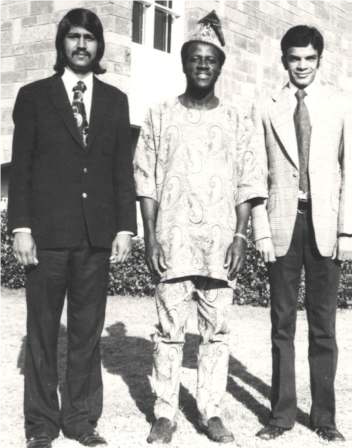 Mr. Shiraz Shariff (left), Vice-President of the Egerton Students Union, together with the Union’s President, Mr. U.A. Salau (centre), and Treasurer Moez Fazal, during the 1974–1975 academic year (Both photos in the story courtesy of Mr. Shariff) I was assigned a cornerroom at Old Hall and marvelled at theflowers and green shrubs growing outsidemy window. The magical atmosphere inspired me to write a few poems.inspired me to write a few poems.By 1973 the College had built a reputation for itselfthroughout Africa, and there were students from all over thecontinent in its various programmes. I came across andinteracted with students from Nigeria, Botswana, andTanzania, all of whom were in the Dairy Technology programme with me. The Guildford Institute of Dairyprogramme with me. The Guildford Institute of DairyTechnology was established with funds from overseasdonors. We even had professors from Denmark (Mr. Hanson)and India (Mr. Bhanumurti) on the faculty along withKenyans such as Dr. Peter Shalo, who was the Chairman ofthe Department of Dairy Technology.By 1974 I had become quite involved with studentadvocacy and successfully ran for the position of Vice-President of the Egerton Students Union (ESU). Mr. U. A.Salau of Nigeria was elected as President, and Mr. MoezFazal of Tanzania was elected as Treasurer. We put in a lot ofeffort to develop the Junior Common Room (JCR), arecreational centre for students and a party place with alounge for entertainment. ESU made profits from the JCR canteen, and the money was used for celebrating year-endcanteen, and the money was used for celebrating year-endevents and Christmas parties. It was at such functions that thestudents were able to socialise and make friends.Upon graduation in 1976 with a Diploma in DairyTechnology, I made applications to the agricultural faculties ofthe University of Strathclyde in Scotland, the University ofIowa in the USA, and the University of Guelph in Canada. Itfelt great to be admitted to all three universities. This successwas a confirmation of the recognition Egerton College hadachieved on the international academic stage. I accepted theUniversity of Guelph because of the scholarship I was offered.However, I ended up doing my undergraduate and graduatestudies in Social Work at the University of Calgary.Calgary is a city at the foothills of the Rocky Mountains inAlberta, Canada, which is home to my family. In 1995 I ran in aby-election for public office as Member of the LegislativeAssembly (MLA) for the Government of Alberta and served forfour successful terms from 1995 to 2008. At the beginning ofeach term the MLAs elected from among themselves threePresiding Officers – the Speaker, the Deputy Speaker, and theDeputy Chair of Committees. For two of my terms I was alsoelected by my peers as Deputy Chair of Committees. It did nottake me long to realise that the skills I had built as Vice-President of ESU had prepared me well for the leadership role Iassumed in Alberta.During my days as an MLA I worked on projects of GoodGovernance in various parts of the world, and especially inSouth Africa, which had just dismantled the apartheidestablishment. Alberta had twinned with the Province ofMpumalanga, formerly Central Transvaal of South Africa, andI worked on building capacity in the senior bureaucracy of thatprovince. We had identified ten departments to which weprovided mentors and training at the University of Alberta.President Thabo Mbeki acknowledged to me the positiveimpact our mentorship programme was having on the newcadre in the Mpumalanga government.When in August of 2019, after 46 years for me and 58 yearsfor the first interracial class, some of us alumni had a reunion atNjoro, I was deeply moved to re-live the memories of myyouth, all of which were invigorating and a source of pride. TheUniversity was a most generous host. We are grateful to it as wealso pay tribute to the memory of Dr. William Odongo Omamo,the first African Principal of the College which has given to theworld thousands of agricultural practitioners.
Mr. Shiraz Shariff (left), Vice-President of the Egerton Students Union, together with the Union’s President, Mr. U.A. Salau (centre), and Treasurer Moez Fazal, during the 1974–1975 academic year (Both photos in the story courtesy of Mr. Shariff) I was assigned a cornerroom at Old Hall and marvelled at theflowers and green shrubs growing outsidemy window. The magical atmosphere inspired me to write a few poems.inspired me to write a few poems.By 1973 the College had built a reputation for itselfthroughout Africa, and there were students from all over thecontinent in its various programmes. I came across andinteracted with students from Nigeria, Botswana, andTanzania, all of whom were in the Dairy Technology programme with me. The Guildford Institute of Dairyprogramme with me. The Guildford Institute of DairyTechnology was established with funds from overseasdonors. We even had professors from Denmark (Mr. Hanson)and India (Mr. Bhanumurti) on the faculty along withKenyans such as Dr. Peter Shalo, who was the Chairman ofthe Department of Dairy Technology.By 1974 I had become quite involved with studentadvocacy and successfully ran for the position of Vice-President of the Egerton Students Union (ESU). Mr. U. A.Salau of Nigeria was elected as President, and Mr. MoezFazal of Tanzania was elected as Treasurer. We put in a lot ofeffort to develop the Junior Common Room (JCR), arecreational centre for students and a party place with alounge for entertainment. ESU made profits from the JCR canteen, and the money was used for celebrating year-endcanteen, and the money was used for celebrating year-endevents and Christmas parties. It was at such functions that thestudents were able to socialise and make friends.Upon graduation in 1976 with a Diploma in DairyTechnology, I made applications to the agricultural faculties ofthe University of Strathclyde in Scotland, the University ofIowa in the USA, and the University of Guelph in Canada. Itfelt great to be admitted to all three universities. This successwas a confirmation of the recognition Egerton College hadachieved on the international academic stage. I accepted theUniversity of Guelph because of the scholarship I was offered.However, I ended up doing my undergraduate and graduatestudies in Social Work at the University of Calgary.Calgary is a city at the foothills of the Rocky Mountains inAlberta, Canada, which is home to my family. In 1995 I ran in aby-election for public office as Member of the LegislativeAssembly (MLA) for the Government of Alberta and served forfour successful terms from 1995 to 2008. At the beginning ofeach term the MLAs elected from among themselves threePresiding Officers – the Speaker, the Deputy Speaker, and theDeputy Chair of Committees. For two of my terms I was alsoelected by my peers as Deputy Chair of Committees. It did nottake me long to realise that the skills I had built as Vice-President of ESU had prepared me well for the leadership role Iassumed in Alberta.During my days as an MLA I worked on projects of GoodGovernance in various parts of the world, and especially inSouth Africa, which had just dismantled the apartheidestablishment. Alberta had twinned with the Province ofMpumalanga, formerly Central Transvaal of South Africa, andI worked on building capacity in the senior bureaucracy of thatprovince. We had identified ten departments to which weprovided mentors and training at the University of Alberta.President Thabo Mbeki acknowledged to me the positiveimpact our mentorship programme was having on the newcadre in the Mpumalanga government.When in August of 2019, after 46 years for me and 58 yearsfor the first interracial class, some of us alumni had a reunion atNjoro, I was deeply moved to re-live the memories of myyouth, all of which were invigorating and a source of pride. TheUniversity was a most generous host. We are grateful to it as wealso pay tribute to the memory of Dr. William Odongo Omamo,the first African Principal of the College which has given to theworld thousands of agricultural practitioners. -

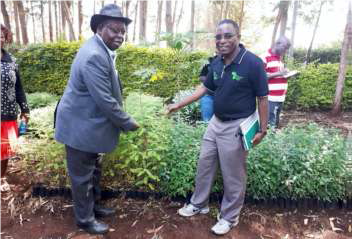 Dr. David Mulama Amudavi (right) with Biovision Farmer CommunicationDr. David Mulama Amudavi (right) with Biovision Farmer CommunicationProgramme Advisory Board Chair, Mr. John Njoroge of the Kenya Institute of OrganicFarming visit one of the Biovision outreach projects in Kirinyaga County, on 14December 2017. (Photo courtesy of Dr. Amudavi)I would like you to bring that capI would like you to bring that caphome”, my father whispered to me as heguided me to a spot from which I couldbest follow the graduation ceremony atthe University of Nairobi in 1984. I wasone of my dad's ten children, and, withthe foresight he possessed regarding thepower of education, he wanted all of us todo well in school. Soon, I became thesubject of his particular encouragementas he had discerned an academic interestand thirst for knowledge in me. Today Iam what I am because of his vision forme. My father's words sank deep into my consciousness. The more I thought about consciousness. The more I thought aboutthem the more I was convinced thatnothing could stop me from making thema reality. Sadly, my father did not livelong enough to experience the pride ofmy having acquired three “caps” – fromKenya, Australia, and North America.That momentous graduation tookplace just before I joined Alliance HighSchool for my A-level following a sterling performance as the best O-levelsterling performance as the best O-levelcandidate at Kakamega High School.Those days Kakamega High wasrenowned for its great football team, theGreen Commandos, who still play today.I marvelled at the wonders theyperformed on the field, but mostlyfocused on my academic assignments.The day my dad took me to Alliance isetched in my memory. This was theschool I had longed to join ever since Ihad scored 3 A's in the Kenya Certificateof Primary Education Examinations – theschool that would make me “strong to serve”.serve”.I completed my studies at Allianceand gladly accepted my second choicefor my higher education (the first hadbeen medicine) – that of Bachelor ofScience in Agricultural Education andExtension at Egerton University. Thisturned out to be a great bi-professionalprogramme in agriculture and educationthat saw me benefit from the great coaching, mentorship and guidance bycoaching, mentorship and guidance byEgerton dons, including the late Prof.Wycliffe Ong'ondo, Prof. Joash Kibett,Prof. Nephat Kathuri, and Prof.Christopher Onyango. When time camefor teaching practice, I went to Moi HighSchool, Kabarak, together with mycolleague, the late Dr. Mary ChepkiteLopokoiyit. As for my field attachment, itwas in Nyandarua County, where Ishared a room with two other students,one of whom is now a high schoolprincipal and the other a senioragricultural economist in the Ministry ofAgriculture.Going through various courses ofmy programme, referred to as AGED,shaped my professional future. We wouldbe up at 4am, dressed in aprons andgumboots, to start Livestock Procedures,which we called Livestock Duties.Dealing with poultry, sheep, goats, andmilking dairy cows manually and withthe use of machines made me appreciatethe value of hands-on experience. I wasthrilled to learn to drive and operate afarm tractor under the direction of Prof.Godfrey Ngunjiri and his team inAgricultural Engineering. Prof. LouisMumera taught us to keep time. If youcame to his class late, he would stopteaching until you, the unpardonablewrongdoer, left the room. This instilled inme a great sense of discipline.Life on campus was exciting andgenerally free of trouble. The HigherEducation Loans Board allowance wewere given, the famous “boom”, wassufficient to meet all our basic needs. Thefood was excellent. We used to have awonderful breakfast with quality tea,bread, sausages, and fruits. A sense ofcommunity developed among us as weshared our delicious meals.O n c o m p l e t i o n o f m yundergraduate studies, I had the option ofteaching Agriculture and Biology in ahigh school or joining agricultural e x t e n s i o n w i t h t h e M i n i s t r y o fe x t e n s i o n w i t h t h e M i n i s t r y o fAgriculture or a related institution. Ichose teaching, and in June 1990 theTeachers Service Commission (TSC)posted me to Lumakanda Girls inWestern Kenya. However, as graduationapproached, I was both surprised andproud to be offered the position ofTeaching Assistant in my Department ofAgricultural Education and Extension.This was on account of the first classhonours degree I had obtained and thestrong grade in the dreaded Grade PointAggregate (GPA) system. By 1 October1990 I was back at Egerton as a “TA”.Transiting from a student to a universityacademic staff member so quicklyinspired me beyond measure, and I couldsee myself becoming a professor oneday! I was now “material” for staffdevelopment. I did not disappoint.Within one year, I was awarded ascholarship from Australia's Equity andMerit Scholarship Scheme (EMSS). Ijoined Melbourne University for aM a s t e r ' s p r o g r a m m e , w h i c h Isuccessfully completed. In addition, itwas while at Melbourne that I met theyoung woman who would become mywife.In 1994, I returned to Egerton andcontinued teaching my favourite subjects– Agricultural Extension, RuralSociology, Technical Report Writing,and Communication Skills.Within three years, I became alecturer.Teaching with a Master's degree at theUniversity was not good enough for me,nor did the University encourage it. I hadalways wanted to study either in theUnited States or Europe for myd o c t o r a t e . M y s t r o n g a c a d e m i cbackground, established by EgertonUniversity and buttressed by MelbourneUniversity, saw me land a RockefellerFoundation Scholarship in 2001 topursue a doctorate in Adult andExtension Education with minors inDevelopmental Sociology and NaturalResource Management (NRM) atCornell University, USA. I obtained myPh.D. degree and returned to Egerton University in 2005.University in 2005.Soon after, in July 2006, I undertook atwo-year postdoctoral fellowship withthe International Centre of InsectPhysiology and Ecology (ICIPE), undertheir project “Creating Smallholder-LedG r o w t h t h r o u g h ' P u s h - P u l l 'Technologies in Eastern Africa”. As partof my work on this project, I supervisedtwo Ph.D. and five Master's students.The postdoctoral opportunitytriggered a life-changing turn in mycareer. I was suddenly faced with adilemma: Should I continue teaching orshould I join ICIPE as a senior scientist?If I settled for ICIPE, I would coordinatea Farmer Communication Programme(FCP) and start a new organisationaround it. After considerable thought, Ileft teaching. I have not regretted mydecision.In 2011, I started the BiovisionAfrica Trust (BvAT) based at ICIPE, inKasarani, Nairobi. As the ExecutiveDirector I oversee the running of all itsprogrammes in Kenya and Africa. Theorganisation runs an FCP, to promotefood security, economic growth, andenvironmental stability. It disseminatesinformation and knowledge to farmersthrough multiple channels, whichinclude Infonet-Biovision (a web-basedknowledge platform); The OrganicFarmer Magazine; The Organic FarmerRadio (TOF Radio), which airsagricultural news on KBC and somevernacular stations; Mkulima Mbunifu, afarmers' magazine for Tanzania; andoutreach programmes with farmerresource centres in 13 counties in Kenya.We put effort into facilitating the sharingof information, knowledge, andexperiences from farmer-to-farmer, andexperts-to-farmers and vice-versa.T h r o u g h m y o rg a n i s at i o n Icoordinate the African Union-supportedEcological Organic Agriculture (EOA)Initiative implemented in nine countriesin Africa (i.e. Benin, Kenya, Ethiopia,Mali, Nigeria, Senegal, Rwanda,Tanzania, and Uganda). The overall goalof the initiative is to mainstream EOAinto national agricultural production systems by 2025 to improve agriculturalsystems by 2025 to improve agriculturalproductivity, food security, access tomarkets, and sustainable development inAfrica. I also oversee the Secretariat ofthe Continental Steering Committeeproviding oversight to the continentalinitiative on behalf of the African UnionC o m m i s s i o n . I c o o r d i n a t e t h eK n o w l e d g e C e n t r e o n O r g a n i cAgriculture in Africa for the EasternAfrica region currently covering Kenya,Uganda, Tanzania, and Rwanda. Thegoal of the project is to ensure knowledgehubs are successfully introduced as aninnovative strategy for promotingorganic agriculture in West, East, andSouthern Africa.I have alliances in promotinggenuine sustainable agriculture that gobeyond Africa. In this regard I waselected member of the World Board ofthe International Federation of OrganicAgriculture Movements (IFOAM) –International Organics. The 10-memberteam is charged with overseeing andsupporting IFOAM's work in growingthe global organic marketplace,communicating the benefits of organicagriculture, training organic leaders, andfacilitating capacity-building for organicfarmers.Though currently working at theinterface of research, practice, andpolicy, I continue to connect withacademia through supervision ofgraduate students and undertaking of therole of an external examiner for Ph.D.and Master's theses from variousuniversities in East Africa.I will forever be indebted to EgertonU n i v e r s i t y f o r m y v e r s a t i l i t y,disposition, strength, and resilience toserve in many capacities while workingwith farmers, researchers, practitioners,a c a d e m i c s , p o l i c y m a k e r s , a n ddevelopment partners not only in Kenyabut also across our great continent andthe globe.Long live Egerton University!
Dr. David Mulama Amudavi (right) with Biovision Farmer CommunicationDr. David Mulama Amudavi (right) with Biovision Farmer CommunicationProgramme Advisory Board Chair, Mr. John Njoroge of the Kenya Institute of OrganicFarming visit one of the Biovision outreach projects in Kirinyaga County, on 14December 2017. (Photo courtesy of Dr. Amudavi)I would like you to bring that capI would like you to bring that caphome”, my father whispered to me as heguided me to a spot from which I couldbest follow the graduation ceremony atthe University of Nairobi in 1984. I wasone of my dad's ten children, and, withthe foresight he possessed regarding thepower of education, he wanted all of us todo well in school. Soon, I became thesubject of his particular encouragementas he had discerned an academic interestand thirst for knowledge in me. Today Iam what I am because of his vision forme. My father's words sank deep into my consciousness. The more I thought about consciousness. The more I thought aboutthem the more I was convinced thatnothing could stop me from making thema reality. Sadly, my father did not livelong enough to experience the pride ofmy having acquired three “caps” – fromKenya, Australia, and North America.That momentous graduation tookplace just before I joined Alliance HighSchool for my A-level following a sterling performance as the best O-levelsterling performance as the best O-levelcandidate at Kakamega High School.Those days Kakamega High wasrenowned for its great football team, theGreen Commandos, who still play today.I marvelled at the wonders theyperformed on the field, but mostlyfocused on my academic assignments.The day my dad took me to Alliance isetched in my memory. This was theschool I had longed to join ever since Ihad scored 3 A's in the Kenya Certificateof Primary Education Examinations – theschool that would make me “strong to serve”.serve”.I completed my studies at Allianceand gladly accepted my second choicefor my higher education (the first hadbeen medicine) – that of Bachelor ofScience in Agricultural Education andExtension at Egerton University. Thisturned out to be a great bi-professionalprogramme in agriculture and educationthat saw me benefit from the great coaching, mentorship and guidance bycoaching, mentorship and guidance byEgerton dons, including the late Prof.Wycliffe Ong'ondo, Prof. Joash Kibett,Prof. Nephat Kathuri, and Prof.Christopher Onyango. When time camefor teaching practice, I went to Moi HighSchool, Kabarak, together with mycolleague, the late Dr. Mary ChepkiteLopokoiyit. As for my field attachment, itwas in Nyandarua County, where Ishared a room with two other students,one of whom is now a high schoolprincipal and the other a senioragricultural economist in the Ministry ofAgriculture.Going through various courses ofmy programme, referred to as AGED,shaped my professional future. We wouldbe up at 4am, dressed in aprons andgumboots, to start Livestock Procedures,which we called Livestock Duties.Dealing with poultry, sheep, goats, andmilking dairy cows manually and withthe use of machines made me appreciatethe value of hands-on experience. I wasthrilled to learn to drive and operate afarm tractor under the direction of Prof.Godfrey Ngunjiri and his team inAgricultural Engineering. Prof. LouisMumera taught us to keep time. If youcame to his class late, he would stopteaching until you, the unpardonablewrongdoer, left the room. This instilled inme a great sense of discipline.Life on campus was exciting andgenerally free of trouble. The HigherEducation Loans Board allowance wewere given, the famous “boom”, wassufficient to meet all our basic needs. Thefood was excellent. We used to have awonderful breakfast with quality tea,bread, sausages, and fruits. A sense ofcommunity developed among us as weshared our delicious meals.O n c o m p l e t i o n o f m yundergraduate studies, I had the option ofteaching Agriculture and Biology in ahigh school or joining agricultural e x t e n s i o n w i t h t h e M i n i s t r y o fe x t e n s i o n w i t h t h e M i n i s t r y o fAgriculture or a related institution. Ichose teaching, and in June 1990 theTeachers Service Commission (TSC)posted me to Lumakanda Girls inWestern Kenya. However, as graduationapproached, I was both surprised andproud to be offered the position ofTeaching Assistant in my Department ofAgricultural Education and Extension.This was on account of the first classhonours degree I had obtained and thestrong grade in the dreaded Grade PointAggregate (GPA) system. By 1 October1990 I was back at Egerton as a “TA”.Transiting from a student to a universityacademic staff member so quicklyinspired me beyond measure, and I couldsee myself becoming a professor oneday! I was now “material” for staffdevelopment. I did not disappoint.Within one year, I was awarded ascholarship from Australia's Equity andMerit Scholarship Scheme (EMSS). Ijoined Melbourne University for aM a s t e r ' s p r o g r a m m e , w h i c h Isuccessfully completed. In addition, itwas while at Melbourne that I met theyoung woman who would become mywife.In 1994, I returned to Egerton andcontinued teaching my favourite subjects– Agricultural Extension, RuralSociology, Technical Report Writing,and Communication Skills.Within three years, I became alecturer.Teaching with a Master's degree at theUniversity was not good enough for me,nor did the University encourage it. I hadalways wanted to study either in theUnited States or Europe for myd o c t o r a t e . M y s t r o n g a c a d e m i cbackground, established by EgertonUniversity and buttressed by MelbourneUniversity, saw me land a RockefellerFoundation Scholarship in 2001 topursue a doctorate in Adult andExtension Education with minors inDevelopmental Sociology and NaturalResource Management (NRM) atCornell University, USA. I obtained myPh.D. degree and returned to Egerton University in 2005.University in 2005.Soon after, in July 2006, I undertook atwo-year postdoctoral fellowship withthe International Centre of InsectPhysiology and Ecology (ICIPE), undertheir project “Creating Smallholder-LedG r o w t h t h r o u g h ' P u s h - P u l l 'Technologies in Eastern Africa”. As partof my work on this project, I supervisedtwo Ph.D. and five Master's students.The postdoctoral opportunitytriggered a life-changing turn in mycareer. I was suddenly faced with adilemma: Should I continue teaching orshould I join ICIPE as a senior scientist?If I settled for ICIPE, I would coordinatea Farmer Communication Programme(FCP) and start a new organisationaround it. After considerable thought, Ileft teaching. I have not regretted mydecision.In 2011, I started the BiovisionAfrica Trust (BvAT) based at ICIPE, inKasarani, Nairobi. As the ExecutiveDirector I oversee the running of all itsprogrammes in Kenya and Africa. Theorganisation runs an FCP, to promotefood security, economic growth, andenvironmental stability. It disseminatesinformation and knowledge to farmersthrough multiple channels, whichinclude Infonet-Biovision (a web-basedknowledge platform); The OrganicFarmer Magazine; The Organic FarmerRadio (TOF Radio), which airsagricultural news on KBC and somevernacular stations; Mkulima Mbunifu, afarmers' magazine for Tanzania; andoutreach programmes with farmerresource centres in 13 counties in Kenya.We put effort into facilitating the sharingof information, knowledge, andexperiences from farmer-to-farmer, andexperts-to-farmers and vice-versa.T h r o u g h m y o rg a n i s at i o n Icoordinate the African Union-supportedEcological Organic Agriculture (EOA)Initiative implemented in nine countriesin Africa (i.e. Benin, Kenya, Ethiopia,Mali, Nigeria, Senegal, Rwanda,Tanzania, and Uganda). The overall goalof the initiative is to mainstream EOAinto national agricultural production systems by 2025 to improve agriculturalsystems by 2025 to improve agriculturalproductivity, food security, access tomarkets, and sustainable development inAfrica. I also oversee the Secretariat ofthe Continental Steering Committeeproviding oversight to the continentalinitiative on behalf of the African UnionC o m m i s s i o n . I c o o r d i n a t e t h eK n o w l e d g e C e n t r e o n O r g a n i cAgriculture in Africa for the EasternAfrica region currently covering Kenya,Uganda, Tanzania, and Rwanda. Thegoal of the project is to ensure knowledgehubs are successfully introduced as aninnovative strategy for promotingorganic agriculture in West, East, andSouthern Africa.I have alliances in promotinggenuine sustainable agriculture that gobeyond Africa. In this regard I waselected member of the World Board ofthe International Federation of OrganicAgriculture Movements (IFOAM) –International Organics. The 10-memberteam is charged with overseeing andsupporting IFOAM's work in growingthe global organic marketplace,communicating the benefits of organicagriculture, training organic leaders, andfacilitating capacity-building for organicfarmers.Though currently working at theinterface of research, practice, andpolicy, I continue to connect withacademia through supervision ofgraduate students and undertaking of therole of an external examiner for Ph.D.and Master's theses from variousuniversities in East Africa.I will forever be indebted to EgertonU n i v e r s i t y f o r m y v e r s a t i l i t y,disposition, strength, and resilience toserve in many capacities while workingwith farmers, researchers, practitioners,a c a d e m i c s , p o l i c y m a k e r s , a n ddevelopment partners not only in Kenyabut also across our great continent andthe globe.Long live Egerton University! -
 The Council and Senate of Egerton University request the honour of your company to the 43rd Graduation Ceremony (Virtual) for the conferment of Degrees and award of Diplomas and Certificates by The Chancellor, Dr. Narendra Raval (Guru), D.Sc.(hc) EBS on Friday, 18 June 2021. Join the Ceremony live from 9.00 a.m. to 1.00 p.m.
The Council and Senate of Egerton University request the honour of your company to the 43rd Graduation Ceremony (Virtual) for the conferment of Degrees and award of Diplomas and Certificates by The Chancellor, Dr. Narendra Raval (Guru), D.Sc.(hc) EBS on Friday, 18 June 2021. Join the Ceremony live from 9.00 a.m. to 1.00 p.m. -

The 45th Graduation of Egerton University is the long-awaited event at which we can acknowledge with pride that the hard work, sacrifice,which we can acknowledge with pride that the hard work, sacrifice,and resilience of our students have paid off.
-
 Egerton University, through the Directorate of Confucius Institute and the Directorate of International Linkages and Careers Services, is organizing a Campus Career Day that will be held on Thursday 24th June 2021.
Egerton University, through the Directorate of Confucius Institute and the Directorate of International Linkages and Careers Services, is organizing a Campus Career Day that will be held on Thursday 24th June 2021. -

The substantive date for 8th edition of the Mau-Egerton University Cross Country is Saturday, 25th February 2023. The event will be held at Egerton University Sports Ground Njoro Campus.
-

I was admitted to Egerton University at Njoro to pursue a Bachelor of Arts degree in 2016. The opportunity allowed me to study three disciplines, and I settled for Economics, Mathematics and Sociology. In the third year I dropped Mathematics and concentrated on the other two disciplines, which I had found both exciting and intriguing.
-

Here is the story of Mr. William Amwayi who is an Executive Secretary and Technical Assistant to ISO President, Engineer Eddy Njoroge. Mr. Amwayi is an Egerton University Alumnus having earned a BSC. in Animal Science (2007).
-

On Saturday, it was pomp and colour when the Alumni Association flowed into Egerton University for their annual sports day to enjoy playing and competing various games.
-

The Egerton University Alumni Association held a handing-over ceremony for its officials at the Milele Resort in Nakuru City on January 21st, 2023. The event was attended by a large number of alumni members, as well as dignitaries from the university and the local community.
-

Egerton University, established in 1939, held a grand Alumni gathering at the United Kenya Club Friday evening. The event brought together former students from various graduating classes, with the oldest representation hailing from the class of 1969.The atmosphere was filled with excitement and nostalgia as the attendees drawn from all over the world reunited to celebrate their alma mater's rich history and the achievements of its graduates.
-

The 49th Congregation for the Conferment of Degrees and Award of Diplomas
-
 In a momentous celebration of ingenuity and groundbreaking ideas, Egerton University's alumni, Joseph Nguthiru, emerged victorious at the recently concluded COP28 event in Dubai. His innovative project earned him a prestigious award from the UAE as part of the Prototypes for Humanity 2023 initiative.
In a momentous celebration of ingenuity and groundbreaking ideas, Egerton University's alumni, Joseph Nguthiru, emerged victorious at the recently concluded COP28 event in Dubai. His innovative project earned him a prestigious award from the UAE as part of the Prototypes for Humanity 2023 initiative. -

-

The Egerton University Alumni Board recently convened the EUAA 79th board meeting on Saturday, August 18, 2024. at Milele Resort in Nakuru City.
-

The Egerton University Alumni Association (EUAA) Secretary General recently welcomed first-year students to the University, congratulating them on their decision to join this esteemed institution.
Page 1 of 2





